

• Messages from the President and General Manager
• MBP Year in Review
• National Organization Reports



• Messages from the President and General Manager
• MBP Year in Review
• National Organization Reports

internal
external committee appointments.
Manitoba Beef Producers acknowledges that we are gathered on ancestral lands, Treaty 1 territory, traditional territory of the Anishinaabeg, Cree, Oji-Cree, Dakota, and Dene Peoples, and on the National Homeland of the Red River Métis Our office in Winnipeg is located on Treaty 1 Territory and the homeland of the Metis Nation Our work on behalf of our members extends throughout Treaties 2, 3, 4 and 5 We respect the Treaties and agreements that were made on these lands, we acknowledge the harms and mistakes of the past, and remain committed to working in partnership with First Nations, Inuit and the Métis Nation in the spirit of reconciliation and collaboration


Looking back on 2024, we experienced overall a very positive year for the industry, especially the cow-calf sector Overall, we had an outstanding growing year, with many forages having record yields Early summer hay forage was a challenge to put up due to wet conditions and high levels of moisture in the plants that created such outstanding growth, but as weather levelled out, a lot of dry hay was put up in good shape Due to the lower cattle numbers in the province, very high forage production and relatively inexpensive feed grain prices, there is an abundance of feed in Manitoba At this point, it seems hard to know how we will get through it, but it is quite a change from the drought years and those serious challenges
Cattle markets continued to rise beyond record levels and displayed some different price patterns Fall 2024 saw calf prices start out strong and rather than softening as we got closer to the end of the year, we actually saw those prices continue to increase Prices on cull cows and bulls also maintained or strengthened through this time rather than dropping off as we would usually expect with high volumes of calves moving
We saw changes to the Agricultural Crown Lands Leases and Permits Regulation come into effect January 1, 2024, allowing for some producer-to-producer transfers and it is my understanding that we have a number of these in the works We have seen the auction system of allocation of forage leases and permits put on hold for another year in 2025 while the provincial government continues to work on more changes to the Crown lands system The provincial government also continued with the freeze on ACL rates for 2025 while they are working out more details about the program
Unfortunately, negative wildlife interactions continue to be a problem for cattle farmers and ranchers in Manitoba We have seen predation levels continue to increase and this is a very challenging issue to get ahead of There have been some welcome changes to Targeted Predator Removal Program, as well as better compensation for the trappers working under this program that will hopefully lead to more control measures We are all aware of how challenging a problem this is and how hard it is to control and we really need those knowledgeable, experienced trappers to work with in dealing with problem predator issues
We have also heard more and more reports of large herds of elk and the issues of fence line damage, winter stored feed consumption and, of course, the huge risk of disease transfer, like bovine tuberculous, that comes along with these very high numbers We are very pleased to see towards the end of 2024 that the Province of Manitoba announced that they would be undertaking wildlife counts to establish where these populations are at, so that measures can be taken from there
Business risk management tools and their efficacy, affordability and comparison to other agricultural sectors continues to be large part of what we do at Manitoba Beef Producers and nationally at the Canadian Cattle Association We know that we need forage and pasture insurance to be more effective and modernized to work better for many producers We need only look at the rate of uptake on these insurance products as compared to those in the crop sector to see how they just are not working for producers However, we will not always be in these bumper crop production years and it is necessary to have these products work and have high enrolment in them to help weather some of the lesser production years that we have experienced and that we will face again
Cost sharing for the premiums for Livestock Price Insurance (LPI) is another area where a lot of advocacy efforts have been made and is necessary for beef producers to be able to better manage risk as compared to other agricultural sectors . This cost shared model is something that we see being done by our neighbours in the United States on similar types of programs and we can look at their data on uptake to see the huge surge in enrolment that obviously comes when you cost share that premium
Finally, it was a pleasure to work throughout the year with the outstanding board and staff at Manitoba Beef Producers I believe we have a very dedicated team working hard on some of the topics I just mentioned and many others Our AGM will see two directors leaving the board: Mary Paziuk (District 13) and Alfred Epp (District 1) . It has been a pleasure serving with both of them Mary has been a long-serving board member, having now done two separate stints as a director, serving in many different roles and taking Manitoba representation forward to entities like the Canadian Beef Check-Off Agency (national check off) and will be missed Alfred has been on the board a shorter amount of time but his great attention to detail and passion for communications will be missed as well I appreciate the time I have had with both on the board and wish them the best going forward Incoming in their respective places, we have Tyler Fewings (District 1) and Matthew Goudie (District 13), who both bring a lot of experience and some strong voices to the board that we look forward to having around the directors table in the future
All the best to you and yours and here’s to a productive 2025!





Greetings and happy 2025 my friends I hope you wrapped up 2024 with some time to unwind and to spend time with those you love most I was able to spend time with my family and reflect on the year Many areas of focus kept MBP busy throughout 2024, and I’ll cover some of the topics in my annual report to the members
In the 2023 Annual Report, I spoke about the importance of strengthening our value chain to help protect the Manitoba’s beef sector against theft and fraud This has been a major area of MBP’s work throughout 2024, which involved a focused investigation on the value and viability of a mandatory livestock inspection system in Manitoba Such a mandatory system has been in place in the western provinces for decades, so the value has been seen there
During our fall district meetings, we hosted roundtable discussions on livestock inspection What is showing the most promise for Manitoba would be a more formal expansion of the work being undertaken by Livestock Services of Saskatchewan (LSS) in Manitoba LSS currently inspects westbound cattle as required after sale in Manitoba However, these inspectors do not currently hold the degree of powers in Manitoba needed to effectively prevent theft and fraud So, if the industry fully wants mandatory inspection implemented in Manitoba, MBP will need to have strong producer support to be able to advocate to the provincial government to make the appropriate legislative changes required to allow LSS to effectively operate in Manitoba There are many layers of complexity when it comes to the MBP board’s decision on whether to pursue implementation of mandatory livestock inspection What we want to ensure at the end of the day is that any added cost for industry provides value
When we think about traceability and its importance for disease management, livestock inspection services have the potential to add value in this area Inspectors being at drop-off at sale facilities could allow for better movement tracking on top of ownership confirmation For example, in Saskatchewan LSS is expanding their digital data management for their services and has developed a digital movement reporting app to simplify meeting manifest and Canadian Food Inspection Agency (CFIA) requirements as they relate to traceability If these types of services were offered to producers in Manitoba, it could bring huge value
Further, simplifying movement reporting and traceability data management not only helps the producer from an administrative standpoint, it would also greatly speed up tracing of animal diseases for CFIA and provincial vet offices A recent bovine tuberculosis outbreak in Saskatchewan that involved trace activities into some Manitoba herds and herds in other provinces is a prime example on why quicker tracing is required The longer it takes to do trace activities, the longer impacted producers herds are quarantined As well, the longer it takes to control a disease outbreak, the longer important trade borders could be shut Thinking back to the BSE era we all know the impacts that has This value-added component makes an overall inspection service in Manitoba way more palatable, even if it is an added cost to producers I look forward to continuing our work on this file in 2025, and confirming where the Manitoba beef industry stands . We want to make sure we consult with as many producers and industry stakeholders as we possibly can before we make a yes or no advocacy decision


Another important area of focus for MBP in 2024 was Business Risk Management (BRM) tools The cattle sector has historically not had as effective a suite of tools to manage risk compared to other agricultural commodities Crop insurance is the gold standard when it comes to BRMs A huge benefit of this program is its cost-shared premiums Governments share the premium costs with producers, which helps keep the cost down for producers With this in mind, MBP has long advocated for this premium support to be consistent in tools like Livestock Price Insurance (LPI) The United States had implemented this support in a similar program for livestock there, and it saw a major increase in producer uptake We want to ensure producers are utilizing tools available to manage risk, and seeing a premium supported LPI would make it more attractive for beef producers to invest in a policy
Another driver for effective BRM tools is the conversations around land conversion We are seeing lots of marginal land being converted to annual crops With a lower risk profile in annual cropping, this is making it more attractive and potentially profitable However, there are unintended consequences with land conversion, including loss of ecosystem services maintained by having cattle on the land Strong BRM tools in the cattle sector would help support keeping these lands in beef production At the end of the day, it’s the producer’s decision how to manage their private land, but support to maintain profitable futures would help This is a key focus area for us at MBP
As we look forward to 2025, many of our efforts will go forward with work on BRM tools, predation, and livestock inspection, to name just a few There is general optimism in the sector, especially with recent prices in the fall run However, many political and trade headwinds exist Obvious concerns have arisen from the proposed tariffs by president-elect Donald Trump With the cattle sector being heavily trade dependent and a high percentage of live cattle and beef traded with the US, these possible tariffs may have ramifications on both sides of the border Work is already bring done on the national and provincial level to lean on relationships in the US to try and avoid tariff hikes I see this issue being a major focus in the start of 2025
I want to thank the MBP team – staff and the board of directors – for their strong dedication and passion for the sector We do great work as MBP, but it wouldn’t be possible without the amazing teamwork and leadership I look forward to tackling challenges and opportunities head on with this team again in 2025
Thank you as well to the producers for the insights you provide to us on so many different issues affecting our sector And thanks to the many other individuals, organizations, elected officials and government staff we work with throughout the year to tackle matters affecting Manitoba’s beef industry
As always, I wouldn’t be able to commit time and effort to the industry if it weren’t for the support of my family Thank you to my wife, Britni, and sons Cohen and Sullivan Life as a dad is my greatest joy
All the best in 2025, as it’s going to be an interesting year
Carson




Executive Committee
Matthew Atkinson
President
Arvid Nottveit
Vice President
Mark Good
Treasurer
Animal Health
Mike Duguid
Chair
Dale Cazakoff

Who is MBP?
Mike Duguid Secretary
Tyler Fulton 2nd Vice-President
Trevor Sund Vice-Chair
Steven Manns
AGM/Nominations/Resolutions
Byron Falk
Chair
Dale Cazakoff
Communications
Alfred Epp
Chair
Steven Manns
Andre Steppler
Crown Lands
Mark Good
Chair
Dale Cazakoff
Byron Falk
Environment
Mike Duguid
Chair
Tyler Fulton
Trevor Sund
Finance
Mark Good
Chair
Arvid Nottveit
Andre Steppler
Governance
Arvid Nottveit
Chair
Brian English
Byron Falk
Andre Steppler Vice-Chair
Steven Manns
Mark Schram Vice-Chair
Mary Paziuk
Arvid Nottveit Vice-Chair
Mary Paziuk
Brian English Vice-Chair
Mark Schram
Mike Duguid Vice-Chair
Mary Paziuk
Alfred Epp Vice-Chair
Tyler Fulton
Production Management
Tyler Fulton
Chair
Mark Good
Arvid Nottveit
Research
Trevor Sund
Chair
Byron Falk
Andre Steppler
Brian English Vice-Chair
Mark Schram
Alfred Epp Vice-Chair
Steven Manns
Manitoba Beef Producers (MBP) is the exclusive voice of the province’s cattle industry, representing approximately 6,000 producers in the cow-calf, backgrounding and finishing sectors MBP is a non-profit organization with a producer-elected board of 14 directors representing different geographic areas of the province Its vision is a vibrant, prosperous, respected, sustainable beef industry in Manitoba
MBP’s mission is to represent the province’s beef producers through communication, advocacy, research, education, and leadership within the industry, to governments and to the public These efforts take place to strengthen the sector’s viability, improve prosperity and ensure a sustainable future for the beef industry in Manitoba for the benefit of our beef producers and all Manitobans
How is MBP’s work funded and what are some examples of where check-off dollars go?
MBP’s activities are funded through the collection of check-off dollars Two check-offs with a combined total value of $5 50/head are levied at the point of sale on all cattle sold in Manitoba Of this, a $3/head mandatory, refundable provincial check-off goes toward financing MBP’s activities on behalf of the local beef industry, including its support for Manitoba Beef & Forage Initiatives These monies also go toward MBP’s membership in organizations such as the Canadian Cattle Association (CCA), the National Cattle Feeders’ Association (NCFA) and others MBP’s levy is collected under the authority of the Cattle Fee Regulation under The Cattle Producers Association Act, a piece of provincial legislation
As well, a mandatory, non-refundable national $2 50/ head Canadian Beef Cattle Check-off is collected on all cattle sold in Manitoba and the monies are transferred to the Canadian Beef Check-off Agency Goals of the Canadian Beef Cattle Check-Off are to increase sales of domestic and export beef and to find better and more efficient methods of producing beef and beef cattle This check-off provides industry funding for the Beef Cattle Research Council for the industry’s national research program, as well as Canada Beef for market development and promotion Public and Stakeholder Engagement (PSE), which operates as a division of the CCA, is also funded through these check-off dollars
Provincial cattle associations like MBP are allowed on an annual basis to decide how these national check-off dollars collected on the sale of cattle in Manitoba are allocated MBP’s provincial allocation of the Canadian
Beef Cattle Check-off for the year beginning April 1, 2024 was as follows: 23 5 % to research, 60% to market development and promotion, 10 5 % to issues management (PSE) and 6% toward provincial investment
For additional information about MBP’s 2023-24 financials, see page 10
How are MBP’s activities organized and executed?
MBP’s activities are guided by the board of directors’ broad direction and executed by staff members and MBP’s Executive and Committee members Full-time staff include general manager Carson Callum, policy analyst Maureen Cousins, communications and marketing lead David Hultin and research and extension specialist Melissa Atchison Part-time staff are administrative assistant Jennifer Patryluk and finance person Deb Walger At times MBP employs contract staff for certain initiatives, like special projects or events
MBP also has two wholly owned subsidiary corporations – the Manitoba Livestock Cash Advance Program Inc (MLCA) and Manitoba Beef & Forage Initiatives Inc (MBFI) They have their own staff and governance structure, but report information to MBP Both the MLCA and MBFI board of directors have MBP representatives on them
MBP directors sit on internal committees to provide input and help develop positions around specific types of issues or opportunities Other committees serve an organizational function, helping to arrange meetings or to plan MBP’s participation in events and communications activities that promote the industry
Strategic direction
MBP’s activities focus around key objectives: telling the industry’s story via advocacy and enhanced communications; building the industry with innovation, improved economic competitiveness and profitability; and, serving MBP’s members by developing the organization and its capacity These strategic objectives dovetail with MBP’s mission to strengthen the viability of Manitoba’s beef sector and to ensure a sustainable future for our province’s beef industry The following is an overview of some key matters affecting Manitoba’s cattle industry in 2024 and activities undertaken by MBP in support of the sector
A LOOK BACK AT SOME OF MBP’S WORK IN 2024 2024 Production Situation
What a difference a year makes in terms of production conditions There were continued drought concerns in
Additionally, MBP is represented by directors or staff at several national and provincial organizations and external committees. This affords MBP the opportunity to bring forward Manitoba-specific perspectives on topics such as business risk management programs, traceability, animal care, research, trade, sustainability initiatives and more. Examples of these in 2024 included:
Examples include:
• Assiniboine River Basin Initiative: Alfred Epp, Maureen Cousins Association of Manitoba Community Pastures: Carson Callum
• Beef Cattle Research Council: Melissa Atchison, Trevor Sund
• Canadian Beef Check-off Agency: Mary Paziuk
• Canadian Cattle Identification Agency: Brian English
• Canadian Cattle Association: Tyler Fulton, Mike Duguid, Matthew Atkinson, Arvid Nottveit
• Canadian Roundtable for Sustainable Beef: Maureen Cousins, Carson Callum
• Manitoba Beef & Forage Initiatives: Alfred Epp, Steven Manns
• Manitoba Forage & Grassland Association: Mike Duguid
• Manitoba Livestock Cash Advance: Mark Good, Mike Duguid, Arvid Nottveit, Mary Paziuk, Andre Steppler
• National Cattle Feeders Association: Jonathan Vaags, Carson Callum
• Verified Beef Production Plus Program: Brian English
parts of Manitoba during the 2023 growing season However, after a milder 2023-24 winter that saw lower than average snowfall in many areas, a protracted chilly spring ushered in ample rain in May, June and July over much of the province This allowed for needed recharge of water resources and helped to rejuvenate pasture and forage stands, although frequent rains made for haying challenges and unfortunately some acres went unseeded No emergency-related programs were implemented in 2024 in Manitoba, such as AgriRecovery, the Hay Disaster Benefit nor the Livestock Tax Deferral provision (LTD) Overall, heading into winter 2024-25 most producers were feeling optimistic about their water and feed supplies
However, the overall size of the Manitoba beef cattle herd continued to shrink on a yearover-year basis in 2024 compared to 2023 According to Statistics Canada’s July 1, 2024 Livestock Estimates report, in terms of Manitoba’s beef herd:
• On all cattle operations, there were 960,000 head, down 35,000 from July 1, 2023; On beef operations, there were 882,600 head, down 36,000 head;
• On cow calf operations, there were 687,700 head, down 22,600 head;
• On feeder and stock operations, there were 134,900 head, down 9,400 head; and,
• On feeding operations, there were 60,000 head, down 4,000 from a year prior
Some of this herd shrinkage can be attributed to strong cattle prices and some producers deciding to exit the industry after several years of lower prices and challenging production conditions Further, having a risk management environment that is conducive to the success of the cattle industry is also very important for helping to keep producers on the landscape
Risk Management and Beneficial Management Practice Programs
MBP continued to advocate for business risk management (BRM) programs and other risk mitigation tools that recognize the unique needs of the beef sector Such tools must be affordable, equitable, simple to use, trigger in a timely fashion if needed, and there should also be flexibility to address specific sectoral needs
For example, MBP, along with other beef industry stakeholders continue to ask the federal government make the Livestock Tax Deferral provision more responsive One concern is that it excludes producers who fall outside of the prescribed regions’ boundaries yet whose operations have been impacted by extreme weather events like droughts or floods Finance Canada is being asked to consider amending the Income Tax Act to give producers the ability to self-elect rather than rely on a geographic determination This would make the program timelier and more responsive, helping to address producer concerns about falling outside boundary lines, and recognizing there can be consecutive years of adverse weather conditions affecting an operation The beef industry also wants the definition of ‘breeding animals’ amended to include all classes of cattle When dealing with severe weather events, whole herd decisions are required
The beef industry has repeatedly provided recommendations to improve AgriStability, including that the payment trigger be enhanced to 85% of the reference margin Also very important is the need to either remove or significantly increase the existing $3 million payment cap as it discriminates against larger cattle operations, such as feedlots BRM program caps need adjustments to better account for both inflation and the size and complexity of today’s operations The beef sector has also identified the need to adjust allowable expenses so that producers who grow their own feed are treated equitably with producers who purchase feed And, industry has requested that pasture rental be deemed an eligible forage expense
Another important BRM tool for cattle producers is Livestock Price Insurance (LPI) This is a market-based, insurance-style program that lets producers manage price, currency and basis risk protection for all classes of cattle However, unlike AgriInsurance which provide for cost-shared premiums for crop insurance (40% producer, 34% federal and 26% provincial government contributions), beef producers bear the entire cost of LPI premiums In the United States producer uptake in a program similar to LPI – the Livestock Risk Protection (LRP) program – grew substantially when premium subsidies were introduced in 2020 MBP is seeking cost-shared premiums for LPI that would help put Canadian livestock producers on a more even playing field with crop producers, as well as with US cattle farmers and ranchers, when it comes to premium cost-sharing
Throughout 2024 MBP regularly engaged with Manitoba Agricultural Services Corporation (MASC) about programs and services it delivers The lack of a level playing field around insurance offerings remains a concern for the beef industry, with comparatively limited uptake on AgriInsurance products like pasture and forage production compared to crop-related programs . For example, MASC’s 2023-24 Annual Report noted that for Pasture Insurance only 314 producers insured pastures for 47,384 livestock in 2023/24 Under the Pasture Days Insurance program, only 116 producers took policies, representing 25,574 livestock in 2023/24 These figures represent only a small percentage of the province’s beef producers, pasture lands and total cattle .
MBP believes some types of pasture and forage programs used in other provinces may be more attractive to local producers For example, Alberta producers can access Moisture Deficiency Insurance (pasture) and Moisture Deficiency Endorsement (hay), while Saskatchewan has the Forage Rainfall Insurance Program These programs integrate technology to better pinpoint areas where producers would be eligible for compensation Much analysis has been conducted in this area and MBP believes a determination is needed on possible future offerings of these kinds of tools in Manitoba MBP continues these conversations with MASC
Insurance Task Team The team is made up of reps from the CCA, provincial cattle groups, agencies like MASC, Agriculture and Agri-Food Canada, as well as the dairy and forage sectors It is working to improve uptake of forage insurance by ensuring pasture and forage program offerings better meet producers’ needs
MBP reiterated to MASC the need for convenient producer access to MASC offices MBP recognizes the provincial government has committed to opening more two offices, with details still pending at year’s end In the interim, MBP has sought assurances that MASC’s online and telephone services provide the same type of support as in-person appointments in areas such as claims, BRM programs and lending MBP requests streamlining of MASC programs wherever possible to help reduce participant burden
MBP also discussed with MASC the Wildlife Damage Compensation for Crops program, including the timeliness of adjusting processes, and a desire to see technology used more frequently to help assess losses For example, this could include the use of drones to help determine damages deep into crops by bears, etc
MBP sees value for beef producers in the Advance Payment Program (APP), the federal loan guarantee program that provides producers with access to low-cost cash advances required for inputs In 2024 advances were limited to a maximum of $1 million, with the federal government paying the interest on the first $250,000 of advances MBP supports the CCA’s recommendation that the interest-free portion of the APP be set at $350,000, as was offered in the 2023 program year This higher interest free portion would help recognize the significant impact inflation is having on producer input costs It would also help producers seeking to grow their operations, including providing them with more leverage when negotiating funding arrangements with their financial institutions or other lenders The APP is delivered via the Manitoba Livestock Cash Advance Inc Go to https://manitobalivestock.com/ or call 1-866-869-4008 (toll free)
MBP provides feedback on Manitoba program offerings through the Sustainable Canadian Agricultural Partnership (SCAP) to ensure they are responsive to producers’ needs Examples of cost-shared business risk management practices (BMP) initiatives beef producers could access in 2024 included: purchase of traceability-related technology, risk mitigation practices related to livestock predation, and environment-related initiatives offered through the Resilient Agricultural Landscapes Program and Sustainable Agriculture Manitoba in areas such as grassland and grazing management, water supply, composting and more
Livestock Inspection
A key focal point of MBP’s work in 2024 was on whether mandatory livestock inspection services should be implemented in Manitoba and what steps would be involved to make this happen Cases of theft or fraud related to Manitoba’s cattle industry have proven very costly and disruptive for the affected parties, and can undermine the confidence of lenders, investors and buyers when undertaking livestock-related transactions here Livestock inspection (which does not require branding) is seen as a possible way to reduce livestock-related crimes, to help get lost cattle back to owners, and could potentially offer other value-added elements, such as digital manifests and helping to facilitate movement reporting and traceability requirements
One potential option being explored could involve an agreement to help expand local inspection services via an established third party, one of which – Livestock Services of Saskatchewan – is already providing such services on a per-head basis as needed for Manitoba clients As well, there would need to be some changes to Manitoba’s legislative and regulatory environment to facilitate matters such as livestock inspectors being able to detain cattle or to direct the dealer to hold the sales proceeds until ownership of inspected cattle is verified
Other matters MBP has been investigating around a mandatory livestock inspection system include: cost framework; the service provider and logistics for expanding inspection; engaging other value chain members about their expectations and/or concerns; whether there are funding opportunities to help offset costs of implementing expanded inspection; and more MBP has also been engaging with producers via methods like its fall district meetings, Cattle Country and media interviews to help raise awareness of this issue
In a related vein, MBP has asked the provincial government to create a Livestock Investigations Unit Such a unit would be staffed by a dedicated RCMP officer with livestock industry knowledge who could assist in investigating sector-specific crimes These units already exist in Saskatchewan and Alberta and help support the work of livestock inspection entities MBP has also stressed the importance of Manitoba Justice having personnel familiar with agricultural crimes, and how to successfully investigate and prosecute them MBP believes these approaches could help reduce the number of livestock-related crimes .
A move toward mandatory livestock inspection has been debated multiple times at MBP annual general meetings over the years, with producer opinion split on it each time MBP believes that if the Manitoba government is to make the legislative and/or regulatory changes, as well as other mechanisms necessary to support the implementation of mandatory livestock inspection it will want to be confident that the majority of the province’s cattle producers are in favour of such a move
Therefore Manitoba Beef Producers’ board of directors is taking forward a livestock inspection resolution for producer debate and a vote at its 46th Annual General Meeting on February 20, 2025 in Winnipeg In addition to the preamble, it states as
follows: “Therefore be it resolved to recommend that Manitoba Beef Producers now ask the Government of Manitoba to work with value chain members to take the necessary steps needed to implement mandatory livestock inspection in Manitoba, including: making required legislative and/or regulatory changes; working with the prospective delivery agent on a service agreement; determining if funding can be secured to help offset the cost of an expanded inspection system; deciding whether an investment can be made to support the creation of a Livestock Investigations Unit; and, any other steps required to move this initiative forward in the most responsive, efficient and cost-effective manner.”
Agricultural Crown Lands
Advocacy efforts continued in 2024 on the Agricultural Crown Lands (ACL) Leasing Program A number of changes to the Agricultural Crown Lands Leases and Permits Regulation took effect on January 1 Examples included: forage capacity will be determined when the lease is issued and will remain for the entire length of the agreement; a five-year extension on a 15-year lease term is available to leaseholders that complete and implement a forage management plan for at least the last five years of the 15-year lease term; unlimited transfers of a 15-year forage lease or renewable permit to any eligible lessee for the remainder of the lease term; legacy leaseholders will be able to nominate the next leaseholder, subject to the Treaty Land Entitlement (TLE) and consultation assessment; and, changes to the process for valuing improvements that allow for an appraisal process MBP continues to provide feedback on various aspects of the changes, such as the need to reimburse outgoing lessees for improvements on parcels in cases where they are selected for TLE
Early in 2024 the province indicated there would be no ACL forage leases and permits auction in 2024, and as of the start of 2025, the province has said there would be no such auction in 2025 either The province stated that “With significant program changes to the ACL forage lease program over the past five years, Manitoba is taking time to review the effectiveness of the changes and determine future program priorities ” However, the province also said that casual permits will continue to be available for vacant properties (forage and cropping) through the regular application process for 2025
In the absence of lease and permit auctions MBP has sought clarification as to how the provincial government will treat exiting lease holders who wish to be compensated for their improvements It is very important that outgoing lessees not be penalized if the auction process is delayed for more than two years after the expiry or cancellation of the former holder’s lease or permit
MBP continued to advance the importance of lease affordability and reiterated its request for a change to the forage lease rental rate formula to recognize the considerable ecosystem services beef producers provide in managing these valuable public lands MBP thanks Agriculture Minister Ron Kostyshyn for announcing in October that the rental rate freeze on forage leases and permits in effect in 2024 would continue into 2025
MBP provided feedback to the province on potential approaches for the process for valuing improvements that allow for an appraisal process when ACL leases change hands Understanding there can be various ways to value assets/improvements, MBP suggested the best way is to be consistent with western provinces where that valuation is calculated as replacement cost less depreciation MBP suggested several types of improvements that should be eligible for appraisal and reimbursement to the outgoing lessees, such as: fencing systems, livestock-related buildings, corrals and handling equipment, development and maintenance of roads/trails, water and power source development, rangeland improvements, reseeding or forage restoration costs, draining/ditching, and more MBP asked if there is a way to give young producers a break on improvements when they secure ACL parcels, such as a potential cost share by the province, or tax relief
The continued interest in unit transfers, and the desire by some lease holders to be able to purchase ACL parcels was again raised by MBP with the province MBP also reiterated ongoing concerns related to CLIP acres And MBP continued to call for adequate staffing to handle matters such as enforcement of ACL policies
Wildlife Matters
Predation-related challenges pose a significant concern for Manitoba’s livestock producers, who pride themselves on providing quality animal care and husbandry . MBP continues to advocate for strategies to help reduce the risk of negative wildlife-livestock interactions MBP co-chairs the Livestock Predation Protection Working Group (LPPWG), which includes reps from Natural Resources and Indigenous Futures, Manitoba Agriculture, MASC, Agriculture and Agri-Food Canada, Manitoba Trappers Association and Manitoba Sheep Association (MSA)
The three-year pilot Manitoba Livestock Predation Prevention Project wrapped up in 2023 This important project – funded by the provincial government, MBP and the Manitoba Sheep Association – involved three elements: On Farm Predation Risk Assessments; evaluating various Risk Management Practices (RMPs); and, communication about management practices that could help reduce risk In its project report to the province MBP sought continued cost-shared funding to help producers implement RMPs on their operations, among several other recommendations aimed at reducing risk
MBP was pleased In late April 2024 when the federal and provincial governments announced $500,000 in Sustainable Canadian Agricultural Partnership funding for the Livestock Predation Prevention Program to reduce the risk of livestock predation and promote coexistence of wildlife and livestock The program had two funding streams: Pre-approved Livestock Predation Prevention Equipment and Guardian Dogs and
Predator-Resistant Fence Construction Livestock producers that had a paid livestock predation claim under the Manitoba Wildlife Damage Compensation Program from 2021 or later could apply for the program Eligible applicants could be reimbursed up to 75 per cent of total eligible expenses to a maximum of $5,000 for pre-approved equipment and guardian dogs, and $10,000 for fence construction MBP welcomed these important initiatives and there was good producer uptake on them
MBP had also long sought increased funding to the Manitoba Trappers Association, which administers the Targeted Predator Removal Program Producers with verified predation losses can access the program to secure the services of a trapper to help address problem predators MBP welcomed the Manitoba government’s April announcement that it had increased program funding by $90,000, to a total of $150,000 This will allow the program greater flexibility in addressing livestock predation concerns
MBP discussed delivery of the Wildlife Damage Compensation for Livestock Predation program with MASC Program delivery concerns raised by beef producers have included matters such as: adjusting processes, the need to advise producers of the Targeted Predator Removal Program, compensation levels, and, lack of awareness of the claims appeal process MBP noted the importance of adjuster training to ensure uniformity of understanding of all program elements to provide for consistent program delivery MBP thanks MASC for holding training workshops with its adjustors and Service Centre staff in summer 2024 and for its commitment to streamlining predation reporting processes by producers to MASC staff
At MBP’s 2024 AGM, a resolution was carried asking MASC to track suspected predation-related livestock losses, and asking that this information be shared with government departments and agencies to help better inform the understanding of the scope of predation issues, as well as associated program and policy discussions and decision making in this area MBP thanks MASC for now tracking producer information about suspected predation losses
Animal
MBP had discussions with Manitoba’s Chief Veterinary Officer (CVO) and other Manitoba Agriculture staff about a number of animal health-related matters affecting the beef industry These include questions around availability of animal health products and difficulties securing certain products, such as vaccines Concerns were raised about the efficacy of some products and how these can be addressed Advocacy work continues at the national level to try to get more beef-related animal health products approved for use in Canada
MBP also discussed with the CVO and departmental staff the discovery of bovine tuberculosis in two separate instances in Saskatchewan cattle, the first arising in 2023 and the second in late 2024 The Canadian Food Inspection Agency’s (CFIA) disease investigation trace activities related to the 2023 case led to some Manitoba cattle herds being tested MBP thanks Manitoba Agriculture staff for their assistance in helping local producers affected by this process MBP and Manitoba Agriculture have discussed the importance of testing for bovine TB in wildlife, a practice that ceased in Manitoba in 2023 This request has also been raised with Manitoba’s minister responsible for natural resources At the time of writing, it is not known if the CFIA’s investigation into the 2024 Saskatchewan TB discovery will involve any Manitoba herds
In May 2024 MBP, with the assistance of the CCA met with senior CFIA officials in Ottawa to discuss concerns MBP had identified about effects of the 2023 bovine TB investigation on the impacted Manitoba beef operations These related to matters such as: the testing processes and need for consistent approaches, the lengthy quarantine periods, the need for improved compensation to help cover producers’ costs associated with quarantines (such as added feeding costs) and, the need for improved communication between CFIA staff, producers and producer organizations like MBP during disease investigation processes
MBP is part of a working group seeking improved strategies to address local veterinarian shortages, including training, recruitment and retention initiatives MBP also sees value in increased financial support for the Veterinary Service Districts which were developed to provide rural areas with access to consistent and affordable veterinary care
Another key file on which MBP continues to be focused is the new federal livestock traceability requirements . Knowing who an animal belongs to and where it is going is important for a variety of reasons, be it to establish ownership if an animal is lost or stolen, or to facilitate investigative activities in a disease outbreak like bovine TB As the federal governments moves to enact its updated traceability reporting requirements, MBP wants to ensure such a system is effective and efficient, but not disruptive to our sector
There are gaps and shortcomings around current movement reporting technology MBP is pleased to be participating in the industry-related group looking at the potential creation of a transport/traceability application for cattle operations that could help address a number of movement reporting requirements and potentially provide other value-added benefits to producers MBP is also working to raise producer awareness around traceability and the movement reporting requirements MBP held a producer knowledge transfer event in mid-July where different cattle information management systems, including hardware and software were demonstrated to producers and provincial government staff
MBP had several discussions in 2024 with CFIA staff about the need for improved clarity around the use of Transfer of Care records and Animal Transport Records, as there has been some confusion around the form these documents are to take, when and how they are to be used, and historic record keeping needs
Other Advocacy Activities
MBP worked on a wide array of other matters in 2024 and the following is a brief sampling of these
MBP provided feedback on several provincial and federal government consultations on various aspects of emergency management For example, the province consulted on the potential modernization of the Disaster Financial Assistance Program Among its recommendations, MBP restated its request that the provincial and federal governments revisit the $2 million gross revenue cap for agricultural operations under the Disaster Financial Assistance Arrangements (DFAA) This limitation has adversely affected beef operations and other agricultural producers during recent disaster events It is important the revenue cap is more reflective of current fiscal realities facing our producers Similar concerns were raised during MBP’s spring fly-in in May in Ottawa where it met Members of Parliament and staff from various departments, and in a follow-up meeting with staff associated with the federal Minister of Emergency Preparedness
In a related vein, MBP provided a submission as part of Agriculture and Agri-Food Canada’s consultation on updating its Emergency Management Framework for Agriculture in Canada MBP provided feedback to Public Safety Canada as part of its consultation into advancing a pan-Canadian civilian response capacity during times of emergencies And MBP provided comments on the province’s consultation into proposed amendments to The Shellmouth Dam Compensation Regulation and the Floodway Compensation Regulation Having timely compensation mechanisms related to artificial flooding is very important for affected beef producers
Other examples of advocacy work included: giving feedback on a review of provincial policies around municipal land use planning, as well as a proposed strategy for land use planning in the Winnipeg Metro Region; input on potential right to repair legislation; identifying the need for sound biosecurity strategies for a proposed Manitoba Hydro gas transmission pipeline and a proposed Hydro tap transmission line that would traverse agricultural lands; providing input to Manitoba Transportation and Infrastructure staff on the Regulated Vehicles (Safety Fitness, Operator Identification and Records, and Vehicle Exemptions) Regulation; participation a meeting with the President of the Treasury Board re: Regulatory Cooperation; and much more
In October, MBP hosted a Lunch at the Legislature event with Members of the Legislative Assembly of Manitoba and a number of government staff The aim was to increase awareness about the valuable role that Manitoba’s beef producers play, such as their economic and community impact, as well as the ecosystem services they provide MBP recognizes the considerable diversity of Manitoba’s 57 legislators and the constituencies they represent, and believes it is important to share information about the key roles beef production plays both locally and nationally The event was very well received
MBP, in conjunction with groups such as the CCA and the NCFA undertook joint advocacy activities on a number of federal government files affecting the beef sector Examples included: livestock transportation regulations; commercial transporter hours of service requirements; electronic logging devices; trade matters, such as market access; Bill C-282, An Act to amend the Department of Foreign Affairs, Trade and Development Act (supply management); the need for Specified Risk Material equivalency with the United States; the FMD vaccine bank; and more MBP thanks the CCA and NCFA for their work on these important files and for arranging meetings in Ottawa for MBP with Members of Parliament, Senators and departmental staff
MBP Production-Related Initiatives
MBP launched two initiatives in 2024 to help producers with various aspects of their operations The Verified Beef Production Plus (VBP+) Incentive Pilot is the first Goals are to facilitate the adoption or enhancement of herd data collection and data management, encourage enrollment and support in quality assurance programming, improve the supply chain for certified sustainable programs with Manitoba certified sustainable cattle, enhance traceability and facilitate movement reporting, and, to help off-set VBP+ audit costs for our members Applications are processed on a first come, first served basis See https://mbbeef.ca/our-news/verified-beef-production-plus-vbp-incentive-pilot/
The other new initiative deals with feed testing . MBP has facilitated the placement of feed testing equipment at participating Manitoba Watershed District offices You can access a Star Quality Samplers universal drill mount forage probe at the following offices: East Interlake Watershed District in Gimli, Seine Rat Roseau Watershed District in Steinbach, Souris River Watershed District in Reston, Swan Lake Watershed District in Swan River and, the Westlake Watershed District in Alonsa
Building Sectoral Capacity: Research and Knowledge Transfer
Among MBP’s strategic objectives are building Manitoba’s cattle industry through innovation, improved economic competitiveness and profitability MBP strongly supports investments in research, innovation and knowledge transfer Twenty three cents of every Canadian Beef Cattle Check-Off (national check-off/NCO) dollar collected in Manitoba goes towards conducting and promoting research activities re: beef cattle, beef and beef products A further 6 5 cents of every NCO dollar collected in Manitoba is retained for Manitoba projects that reflect MBP’s research priorities and which align to national priorities
MBP remains a key partner in Manitoba Beef & Forage Initiatives Inc (MBFI), the collaborative beef and forage research and demonstration farm at three sites in the Brandon area Other partners are Manitoba Agriculture and Ducks Unlimited Canada MBP strongly believes the applied research and knowledge transfer activities being undertaken through MBFI can play a critical role in advancing Manitoba’s beef and forage industries, ensuring they are well positioned for future generations of producers
Core funding for MBFI has been provided through the Sustainable Canadian Agricultural Partnership As well, MBP provides financial, administrative and governance support to MBFI Organizationally MBFI’s direction and activities are overseen by an elected board of directors which includes representation from MBP and producers MBP thanks the core partners and the other generous sponsors and contributors for their ongoing commitment to MBFI’s success For more details on MBFI’s activities in 2024 see page 11 or visit www.mbfi.ca to learn more
MBP had another busy year when it came to knowledge transfer and research activities it delivered
In January, MBP once again had a booth at Manitoba Ag Days in Brandon where staff and directors were able to converse with producers, industry stakeholders, and the public The booth served as a learning station for Agriculture in the ClassroomManitoba students, their teachers, and chaperones to learn about the endangered prairie grasslands and how cattle are the keystone species to ensure their health and survival
After the success of the 2023 post MBP AGM workshop on making BRM programming work for your operation, MBP organized another immediately following the 2024 AGM with a theme of data collection and management where producers shared how they collect data from their farm and use it to make informed management and marketing decisions Continuing these workshops, the post 46th AGM in February will host a forum on succession planning featuring Duane Thompson of Tee Two Land and Cattle and their unique succession model
February also saw MBP partner with MBFI to deliver a webinar series on factors affecting beef cow reproduction and fertility This series was in response to widespread reports of extremely high open rates The three-part series featured dynamic and interactive presentations by industry experts Dr Cheryl Waldner, Dr Brittany Sigfusson, and Dr John Popp MBP received very positive feedback and is looking to deliver another series with another timely topic this coming winter The month wrapped up with MBP co-sponsoring a calving workshop featuring Clover the model Cow for University of Manitoba pre-vet and Stockman’s Club members Participants were able to get handson learning with coaching from Dr Richard Hodges MBP has two calving workshops planned in partnership with MBFI and Manitoba Agriculture in 2025
MBP’s third annual producer-focused event held in July at the Ashern Auction Mart built on the momentum of the February 2024 data collection and management workshop It featured live, chute-side demonstrations of various data collection hardware and management software components to show producers different configurations that could work in various on-farm scenarios
MBP was once again a part of the Sustainability in Canadian Agriculture Virtual Conference planning committee The conference takes place each year in March and features world-class speakers from all over the world and hosts hundreds of attendees It brings together researchers, students, producers, government, commodity organizations and industry representatives with a range of perspectives to collectively share ideas and experiences about how to improve agricultural sustainability in Canada
MBP partnered with Manitoba Agriculture and MBFI to organize the second annual Manitoba Beef & Forage Production Conference in Portage la Prairie in October The theme was “Working on the Farm with Hands-On Science!” and covered a range topics such as climate-smart livestock, strategies for the control of Johne’s Disease in western Canadian cow-calf herds, beef nutrition, business risk management programs, livestock predation, and genomic strategies for improving beef cattle efficiencies It was well received
MBP partnered with MBFI for an adult learning session where participants got an overview of MBP’s structure and activities and learned about the beef cattle industry so they can better understand and serve their clients
MBP staff are a part of the Canadian Beef Technology Transfer Network It brings together individuals from across the country who are involved in beef and forage extension efforts The group focuses on identifying opportunities to communicate and collaborate with each other on extension initiatives that lead to greater adoption of relevant technologies and beneficial production practices on Canadian beef farms and ranches
MBP staff regularly participate in meetings of both the Western Canadian Animal Health Network (WeCAHN) Beef Network as well as the Canadian Animal Health Surveillance System (CAHSS) Beef Network
Throughout the year, MBP staff respond to various calls and emails, providing technical expertise and resources on various production-related topics, as well as supporting producers applying for different BMP funding streams Staff also provide clients with technical support for all matters related to the Verified Beef Production Plus (VBP+) Program
MBP is a co-applicant for the University of Manitoba (UM) on the following research initiatives:
• Adoption of multiple mitigation strategies to reduce greenhouse gas emissions in beef cattle production systems ~Dr . Kim Ominski (ongoing)
• Research Chair in Beef Cattle Economic Sustainability -University of Manitoba (BCRC approved Currently procuring industry funds to match )
MBP is a partner providing in-kind support for the National Sciences and Engineering Research Council (NSERC Alliance) project entitled Net zero farming systems using diversity, integration, and perenniality: A co-design approach led by Dr Martin Entz, UM
MBP provided letters of support to accompany letters of intent and full proposals for these research projects:
• Field-Scale Agro-Watershed Modelling for BMP analysis in the Lake Winnipeg Basin – Dr Masoud Asadzadeh, UM
• University of Manitoba project entitled Manitoba's Soil Spectral Library (MSSL)
MBP appreciates the feedback it receives from producers on matters such as research, advances in technology, and knowledge transfer activities
Telling Our Story: Communications, Outreach and Sponsorship MBP’s communications portfolio keeps producers, industry stakeholders and consumers informed and engaged in our work Here are some highlights from a busy and productive 12 months
Industry collaborations
For the fourth consecutive year, MBP participated in the 4-H Manitoba Virtual Food Series Chef Anna Borys shared her culinary talents with 22 young adults over Zoom as they prepared a Big Mac taco recipe together
MBP welcomed the return of the Manitoba Burrowing Owl Recovery Program to the Royal Manitoba Winter Fair in Brandon in March where visitors to a busy MBP booth got to meet and take photographs with Bindi, an adorable burrowing owl, along with her handlers, Alex, and Jessica
Still with the Royal Manitoba Winter Fair, MBP worked with the Canadian Cattle Association Public and Stakeholder Engagement team to debut the Guardians of the Grasslands display The new, 10-foot tall tower connected visitors to the grazing simulation video game of the same name
To ensure school-aged children across Manitoba have access to accurate, balanced, and science-based resources about the beef sector, in July MBP made a three-year, $105,000 commitment to Agriculture in the Classroom-Manitoba (AITC-M) for the development of age-appropriate materials that align with the provincial curriculum This strategic alliance underscores a shared commitment to ensuring the next generation of voters, consumers, leaders and innovators are well-informed about our agriculture industry’s opportunities and challenges MBP believes there is tremendous value in connecting farmers and educators to spark conversations and promote hands-on learning opportunities that bring the farm to the classroom
In September, MBP also participated in ATIC-M’s Amazing Agriculture Adventure that reached 700 students in grades 3-12, along with 40 teachers This immersive event features a variety of stations that foster a deeper understanding of agriculture's vital role
Education and outreach
In May, MBP made a community presentation to the residents of The Wellington Senior Living facility to share information about the industry .
Thirty-five grade 11 students at Winnipeg’s Westwood Collegiate kicked off the May long weekend with a cooking lesson featuring a beef casserole along with a Q&A session
The cooking demo led MBP to participate in the Manitoba Home Economics Teachers' Association professional development day in October MBP did so to establish connections with educators at urban and rural schools with the goal of organizing in-school cooking opportunities throughout 2025
Events
Discover Agriculture in the City – now in its 20th year – is an annual public awareness event to highlight the contributions agriculture makes to the economy, and how important and vital it is for all Manitobans MBP shared space with colleagues from MBFI and generated more than 300 conversations with visitors It took place at the Outlet Collection Winnipeg
Urban and rural Manitobans were invited to explore farming and food production at the popular Discover Agriculture on the Farm open house in September at the Bruce D Campbell Farm and Food Discovery Centre south of Winnipeg More than 400 visitors interacted with MBP
MBP was pleased to be a part of the AG EX event MooMania where two hundred students in grade 3-5 from the Brandon and Westman areas learned about the benefits and the business of beef
We also attended Ag Days in Brandon where over the three-day show, our booth was a busy hub for visitors from across Canada and the United States
At the Canadian Farm Writers’ and Broadcasters’ Awards, Cattle Country editor David Hultin and freelance writer Angela Lovell were jointly recognized with a silver medal in the Communication – Long: The Henry Heald Award category for their work in the December 2023 edition of MBP’s newspaper that explored the emergence of electric vehicles in Manitoba from the perspective of the beef sector The award recognizes the best text of more than 750 words published by a Canadian organization, institution or company intended to provide information to a targeted audience about an agricultural topic
MBP was also recognized at the Canadian Agri-food Marketers Alliance (CAMA) Best of CAMA awards Our new interactive display table, wall and floor graphics that are featured at the Bruce D Campbell Farm and Food Discovery Centre was a finalist in the Execution (Collateral – Exhibit) category The Best of CAMA is the agricultural marketing industry’s annual showcase of creativity, marketing, and communication expertise
Community impact
In February, restaurants across Canada (including 25 in Manitoba) participated in Burger It Forward to help relieve food insecurity This second annual initiative from Canada Beef ‘beefed up’ the protein portion of food bank offerings while supporting locally owned restaurants Each participating restaurant featured a select burger, from classic to creative For each burger purchased, Canada Beef donated the equivalent of one meal to Food Banks Canada, to a maximum of 20,000 meals, while MBP made a $2,000 donation towards Harvest Manitoba
Advertising
MBP participated in a variety of advertising initiatives in 2024 Fields to Forks showcases the journey of Canadian food production and for 2024 MBP highlighted Albert Mutcher of Carman/Stephenfield and his 73-year career in the cattle industry The commercials aired on CTV Winnipeg, 103 1 Virgin Radio, 99 9 Bounce FM, and associated Bell Media digital and social media platforms Of note, the commercial featuring Mr Mutcher was also screened during MBP’s Lunch at the Legislature in October
In November, MBP aired an urban advertising campaign through Winnipeg radio station QX104FM
Great Tastes of Manitoba
MBP continued its participation in Great Tastes of Manitoba, now in its 35th season as Manitoba’s most-watched cooking series This season, Great Tastes partnered with Manitoba Ag Days to create a series of documentaries about the people who work in Manitoba’s agricultural and agri-food sector
The MBP video We Produce Habitat shares messages about the interconnectedness of beef production as a conservation tool for birds and other species It features the MBFI research and demonstration farm along with the Nykolation family
MBP also produced a story from the Swan River area about the sacrifices cattle producers like Anderson Cattle Co make to ensure their cattle are well cared for during Manitoba winters
Media engagement
Throughout 2024, there were at least 127 digital or print stories, TV and radio interviews involving contributions from MBP directors or staff
Subscribers to our weekly e-newsletter continue to grow, as do the number of followers on social media To sign up for the newsletter please contact David Hultin, Communications and Marketing Lead, at dhultin@mbbeef ca The MBP social media handles are available on page 2
Please see pages 20-24 for photo highlights of the year
Serving our members: looking ahead
In 2024 MBP will continue to advocate on behalf our members as we work to advance Manitoba’s beef industry This will include continued work on key files such as business risk management tools, predation, environmental policies, animal care, agricultural Crown lands, water management, livestock-related crime, traceability, public trust and more .
MBP thanks our producer members for your ongoing support Moving the dial on policy issues is not always swift or easy, but your insights and support of our advocacy efforts is sincerely appreciated .
Similarly, MBP appreciates the collaborative efforts between the various industry associations and other value chain members to help the sector respond to various challenges that may arise, such as natural disasters This level of cooperation has been invaluable And, MBP thanks elected officials and government staff at all levels for ongoing engagement on issues and opportunities affecting Manitoba’s beef industry
As always, our organization is stronger when we hear from our members, so please do not hesitate to reach out to us at 1-800-772-0458 or via info@mbbeef ca For more information, please visit MBP’s website at www.mbbeef.ca
Non-Consolidated Statement of Financial Position As at June 30, 2024
Statement of Operations


DR MARY-JANE ORR, MBFI GENERAL MANAGER

In one of our most action-packed year’s to-date, 2024 hit exciting milestones for Manitoba Beef & Forage Initiatives (MBFI) As a not-for-profit research and demonstration farm, the work we do would not be possible without the ongoing foundational support and partnership from Manitoba Beef Producers (MBP), Ducks Unlimited Canada (DUC), and Manitoba Agriculture (MB Ag)
The MBFI Board of Directors sets our strategic direction, builds new connections, and supports the general manager through all of MBFI’s work The 2024 Board was confirmed at our June Annual General Meeting and it includes: Tyler Fewings (Chair; P Ag, beef producer), Laura Plett (Vice Chair; beef producer), Alfred Epp (Treasurer; MBP, beef producer), Steven Manns (MBP, beef producer), Charlotte Crawley (DUC, beef producer) and Daryl Domitruk
The outcomes MBFI achieves would not be possible without our staff which currently includes Clayton Robins (Forage Research), Ron Kristjansson (Beef Research), Josie Pedersen (Extension), Judah Logan (Smart Farm), Lauren McKee (Beef Research), and Chantel McRae (Beef & Forage Roundup Podcast Host) We were thrilled to have Judah join us in the spring of 2024 Judah brings a fresh perspective with a background in Communication Engineering Technology from Assiniboine College Judah’s technical skills and open mind are streamlining the deployment of on-farm technologies Lauren is a summer student alumnus at MBFI, and we are excited to have her rejoining our team this January 2025 full-time as a Beef Research Technician We congratulate Lauren in the completion of her undergraduate degree in Animal Science from the University of Saskatchewan
MBFI is deeply appreciative of our dedicated Board of Directors, Partner & Research Advisory Committees, staff, summer students, and collaborators who have contributed their time and worked diligently to fulfill our mission to advance Manitoba’s beef and forage industry by engaging stakeholders, evaluating on-farm innovation, and providing extension for sustainability of farmers, the public, and the environment In short, our mission is to Engage, Evaluate, and Extend
Engage
MBFI works to engage stakeholders in beef and forage production to build relationships connecting industry, producers, educational institutions, youth, and the public Highlights from 2024 include participating in a collaborative extension initiative focused on water quality, filming with Great Tastes of Manitoba, and sharing career opportunities with 4-H Manitoba
Held alongside the Canadian Beef Industry Conference, the Canadian Beef Technology Transfer Network Annual Meeting was a room packed with people passionate about extension On the agenda for the day, MBFI was honoured to provide an update for a collaborative extension working group on water quality facilitated by the Beef Cattle Research Council (BCRC) The working group, with representatives from across Canada, developed a workplan to improve extension resources for managing water quality The group identified common themes, compiled existing resources, looked for gaps in available extension materials, and developed opportunities to present information in new ways to engage producers With the leadership of BCRC, MBFI is eager to support the work and showcase the variety of practices implemented at our farm stations to improve access and quality of water for livestock
As part of the cooking show Great Tastes Manitoba episode ‘We Produce Habitat’, MBFI was privileged this summer to share findings from applied demonstration studies showcasing the role of beef cattle production in maintaining biodiversity and wildlife habitat Highlighted outcomes included species at risk identified during bird surveys carried out at MBFI farm stations and the Cows and Bees study (2018-2021) around improving low diversity pasture by establishing pollinator habitat The episode features Cameron Nykolation’s cow-calf breeding stock operation and illustrates how cattle are a part of the environment and critical for maintaining the health of our grasslands
Building awareness of opportunities in the beef cattle sector and looking to the future for the up-and-coming workforce is central to supporting agriculture Agri Career Quest is a phenomenal program for 15- to 25-year-olds hosted by 4-H Manitoba MBFI was delighted to participate as one of the stops on the multi-day event Over the course of sharing how our own careers developed, the work we do at MBFI, and taking part in mock student interviews MBFI staff were blown away by the high calibre of students We are excited to continue building resources and welcoming more youth to the farm to learn about connections in how cattle are raised, how wildlife habitat is maintained, and how safe food is produced in Manitoba
On-farm evaluation of production practices and innovative technologies at MBFI’s farm stations provide a place to test the waters and see things in action In the 2024 field season there were nine Tier I demonstration projects, designed as case studies, and seven Tier II projects designed with randomized treatment replication and or control treatment There were also eight ongoing academic research studies associated with MBFI farm stations over the last year
Applied demonstration study topics include continued work on strategic herd development, trace mineral blood serum status, virtual fencing, SenseHub health monitoring, drone seeding, annual forages in diverse mixtures for greenfeed production, silage production of warm season annuals, targeted individual mineral intake, comparison of different forage mixes for sod seeding in a marginal pasture, straw ammonification, forage species demonstration plots at both the Brookdale Farm and First Street pasture, biocontrol of leafy spurge, comparing impact of grazing at different utilization and rest periods, and overall benchmarking of soil health, pasture health, and livestock performance
MBFI has been eager to trial virtual fencing since 2018, and we were finally able to bring a system online this summer grazing season Of the systems available, we were able to source the eShepherd collars through Gallagher Actively using virtual fencing to rotationally graze has been an exciting milestone, and the system has worked well overall Some cautions from our early experiences are to ensure you have handling equipment to safely work around the cow’s head to latch collars It is also recommended to give the cows two to four weeks to train to single virtual fence lines and during that time have cows accessible to handling equipment to monitor the fit of the collars Data connectivity will make or break the logistics of the collars working at different locations, different systems have contrasting trade offs and there are ways to overcome barriers that may come with a higher price tag currently

Extension and knowledge transfer activities at MBFI are grounded in our experience with on-farm research and demonstration studies to promote excellence, efficiency, and sustainability of practices In 2024, MBFI’s extension calendar has been filled with partner events, field days, workshops, and the second year for the Beef and Forage Production Conference
On-farm technology was a theme through a number of summer field days, featuring virtual fencing and drone seeding for pasture rejuvenation MBFI always looks forward to meeting producers through our booth displays at industry meetings or through MBP district meetings Thank you to all the producers and industry members that shared your questions and ideas on a wide array of topics, we look forward to continuing the farmer directed focus in all our work
Looking forward to 2025, MBFI is eager to share findings, continue building partnerships, and delivering extension programing Regular episodes of the Beef & Forage Roundup Podcast are released on the first and third Wednesday of the month, be sure to listen and subscribe to keep up to date with project updates and industry news .
For more information or to start a conversation please email MBFI at information@mbfi. ca or call at 204-761-3300


Knowns and Unknowns

As we start the new year, I’ve reflected on the similarities between cattle production and geopolitics—and how the political world then impacts our sector along with the entire economy
Right now, there is so much uncertainty in the political world An unpredictable president-elect is making waves with every social media post Canada’s Prime Minister started 2025 by resigning and proroguing Parliament until March 24 and we will likely have an election this spring President-Elect Trump’s proposed 25 per cent tariffs cannot be forecasted in any way (level, timing, form, list of goods, countries) and we are preparing for every outcome
It reminds me of how much cattle producers depend on things we cannot predict— weather, markets, currency, workforce, demand On the farm and at CCA we have to do our best at predicting what we can, make peace that we cannot know everything, and most importantly lean in on what we can do 2024 was a busy year and the year ahead is shaping up to be even busier We’re already preparing for various political scenarios to effectively advocate on behalf of beef producers across the country
In 2024 we had a demanding year on Parliament Hill driven mainly by private member’s bills Thanks go to many for appearing before committees, writing letters, meeting with members of parliament and senators, hosting tours across Canada, and generally making our voices heard Threats to future trade negotiations (C-282), opportunities to lower the carbon tax burden (C-234), attempts to target and potentially shrink animal agriculture (C-293 and C-355) and other private member’s bills have been a larger focus of CCA’s time and activity than in past years We have also weighed in on financial proposals around capital gains, the Advance Payments Program limits, business risk management programs, trade deals and ambition and environmental reporting for companies That is at home in Canada There are also forces and momentum outside Canada to consider
In late 2006, the report Livestock’s Long Shadow was released by the UN’s Food and Agriculture Organization This flawed piece of research blamed animal agriculture for more pollution than any other sector of the economy This research was done in part by counting every bit of greenhouse gas production in the livestock-based food production sector and comparing it to others with only partial accounting This error was corrected over time but the message of that original piece continues to be trotted out by anti-meat activists globally We know those anti-meat groups are out there; they show up in meetings and consultations here in Canada and abroad Knowing that, we have and will continue to show up where we see threats and opportunities to counter those voices with the positives of Canadian beef and cattle production
The greenhouse gas footprint of Canadian cattle production is less than half the global average Canadian cattle landscapes are homes to not only carbon sequestration but also many species of birds and wildlife that depend on grazing to develop and maintain habitat features they rely on We know these facts but we cannot be sure they will be brought to standard setting bodies, policy making bodies and other international groups that set goals and policies that Canada uses as a base to set our own goals and policies and international commitments Policy once set is a hard thing to turn It is much easier to impact in its formative stages That is not only a big part of our advocacy in Ottawa but our international advocacy as well By expanding our advocacy to international forums, we’re seeing the pendulum swing back in our favour We have science and evidence on our side—and our credible voice carries weight with policy makers
At home I can generally figure out what needs work and how to address it The policy world is so broad and complex, I am glad we have a strong team working strategically on our behalf CCA has developed an international team beef network to figure out where to be and how to engage effectively and we have built a team to get the work done My time as the elected lead of the Canadian Cattle Association is winding down It has been a challenge to be everywhere I have been requested to be, but I want to assure producers that every decision taken weighs the potential impact we can have, the potential cost in producers’ dollars of going to make that impact and the impact of letting those events unfold without our impact That is often overlooked Decisions are made whether we show up or not We have to decide if others will fight on our behalf or if events are safe to unfold with other voices left to be most impactful
This all takes time and money I am thankful for my family’s support at home and the support of so many crews that let CCA’s elected leadership take time away to serve the industry beyond the home operation Our voice as cattle producers is needed at the table I see how we are received and that has helped me say yes to the requests over the years
As we head into 2025, I know we will continue with trade focus and as the unknowns become reality, CCA will be prepared to advocate on behalf of all of us I want to thank all the producers out there who contribute to their provincial cattle associations Some of those funds help CCA on the national and international issues we continue to work on We work well together on behalf of beef cattle producers from coast to coast I hope the great prices to date continue with positive weather across the country Regardless, we will keep showing up and leaning in, and we will find ways to respond to the next unknown coming at us



As part of the Connectivity and Beef Demand pillars in the National Beef Strategy
The Public and Stakeholder Engagement (PSE) program, jointly delivered by the Canadian Cattle Association (CCA) and Canada Beef, delivers national public trust issue management and proactive content on the societal benefits of raising beef cattle in Canada
Issues Management
Issues management strategies continue to correct misconceptions on the environmental footprint of Canadian beef production This included a submission to the Canadian Restaurant and Foodservice News, highlighting how keeping beef on the menu is a choice that brings sustainability benefits Other issues included monitoring the Beef Cattle Code of Practice public consultation survey and high path avian influenza (HPAI) cases in dairy cattle in the USA
Beef Industry Advocacy
New for this year, PSE launched the Public Advocacy Guide which is available both online and in print The resource provides industry spokespeople with key messages and important statistics at their fingertips Introduction to Media Training was provided to 21 industry stakeholders including primary producers, veterinarians, researchers, academics and the regional Environmental Stewardship Award (TESA) recipients The Beef Advocacy Canada program, a free online training resource for both producers and industry partners, has marked over 130 graduations Crisis communications best practices training was also hosted by PSE and offered for the communications staff in all provincial, regional and national cattle associations
Partnerships
PSE is a member in the Canadian Centre for Food Integrity as well as the Global Meat Alliance Amie Peck, PSE Manager, continues to co-chair the Communications Council at the Global Roundtable for Sustainable Beef as well as the Beef Cattle Committee at the Calgary Stampede PSE staff also support various committees for the Canadian Roundtable for Sustainable Beef and the International Meat Secretariat (IMS)
Consumer Perception Research
Ten key performance indicators (KPIs) were selected to be surveyed on an annual basis, to monitor emerging trends The healthfulness and safety of beef continues to see strong support and there was an eight point jump in the positive perceptions of consumers towards beef as an environmentally friendly food choice This consumer research aids in the overall strategy of the PSE program by highlighting areas of concern by target audience (region, gender, age, income)
Manitobans continue to demonstrate strong support for beef producers and raising beef cattle While the average of respondents that strongly or somewhat agree that beef farmers treat animals humanely is 68%, a whopping 84% of Saskatchewan and Manitoba residents (grouped together for population size) indicated the same
The Guardians of the Grasslands game, a grazing simulation that connects players to the societal benefits of cattle on grasslands, continues to reach audiences in classrooms and beyond This resource is curriculum connected for students in grades 7 and 10 Science in Manitoba More than 20 schools across the province have registered with hundreds of student plays A shorter version of the game, intended for public audiences, is used for events like the Royal Manitoba Winter Fair These opportunities expose thousands of consumers to the environmental benefits of raising beef cattle in Manitoba
Other public outreach for the year focused on the upcycling ability of beef cattle to bolster recognition of the environmental benefits of feedlot systems, as well as cow/ calf production This is the focus of the third short documentary from PSE, called Reduce, Reuse, Ruminate Prior to the public launch of the short film, screening events for influencers and media were held across Canada Combined, the events drew nearly 250 attendees and reached Canadians through content creators on social media as well as print and digital articles Global News also covered the story on broadcast news, reaching millions across Canada
Together with Trails End Beef, Lammles, Chop Steakhouse and conservation organizations, PSE also organized a full day ranch experience for 12 content creators across Canada this summer You can find more details about The Influencer Ranching Experience in CCA’s Action News. The campaign amassed over 1 million impressions and 3,500 engagements (comments, shares, likes)
We are also excited to share that PSE took home three trophies at the Canadian AgriMarketing Awards (CAMA) on November 7th in Calgary The event recognizes the very best in marketing, public and industry relations campaigns every year PSE’s Influencer Ranching Experience previously mentioned took home the win in the Social Specialty Category An op-ed supported by PSE and authored by rancher Bob Lowe was victorious in the Persuasive Writing Category Finally, Reduce, Reuse, Ruminate received the top prize in the Specialty Video category The PSE team is proud of the value generated with producer check-off dollars to enhance public trust in how Canadian beef cattle are raised and is excited about the additional exposure that CAMA offers to the hard work of our industry
For the 2024-2025 fiscal year, PSE is operating with a $705,000 budget, with $528,000 to CCA to administer, and $177,000 to Canada Beef The PSE program is in the second year of a Sustainable Canadian Agricultural Partnership (SCAP) grant to support the Guardians of the Grasslands game and has also successfully garnered an Alberta CAP grant for $78,000 to support crisis communications, consumer research and public outreach
It is our privilege to be able to work on behalf of beef cattle producers across this country everyday Any questions or comments are welcomed by email to Amie Peck at pecka@cattle.ca
Link: www.beefadvocacy.ca
Find us online @RaisingCdnBeef (Facebook, Instagram, TikTok and YouTube)


HOWARD BEKKERING, BOARD CHAIR


The Canadian Livestock Tracking System (CLTS) launched a new option this fall Clients often contact CCIA seeking owner information for lost/stray/found livestock, but due to privacy legislation, CCIA cannot share user’s contact information from the database without consent
To help rectify this issue, CCIA developed a consent request pop-up window The feature offers CLTS users the choice of sharing their contact information with CCIA to retrieve lost and found livestock The update will go live in the fall When new users initially log in, they will encounter the privacy policy with a consent option prompting the disclosure of their contact information, allowing them to agree or disagree Existing users will see a pop-up window displaying the consent information enabling them to choose their option Users can opt in or out of this option and may update their contact privacy by contacting CCIA
CCIA has added a new feature in the CLTS movement reporting model to ease the administrative load for users The enhancement will help ensure compliance with the proposed regulatory amendments and make submitting a move-in event easier The new addition is a live-movement record initiated by the producer All parties (producer, transporter, and recipient) enter their data and then the recipient simply submits the recorded information
Although using the movement model currently is not a regulatory requirement, it is a proposed regulation and represents a significant step towards traceability
Using the movement module will strengthen the effectiveness of traceability efforts, leading to quicker location and notification of stakeholders in the event of a disease outbreak
This year CCIA launched a Retention Matters campaign focused on education to increase indicator retention in livestock The campaign promotes the benefits of following best practices using CCIA-approved indicators with the manufacturer-recommended applicator For information on how to improve retention visit: retentionmatters.ca
We want to hear from you!
We are always looking for ways to improve our service and support We value your feedback and encourage you to contact us at 1-877-909-2333 or info@canadaid.ca
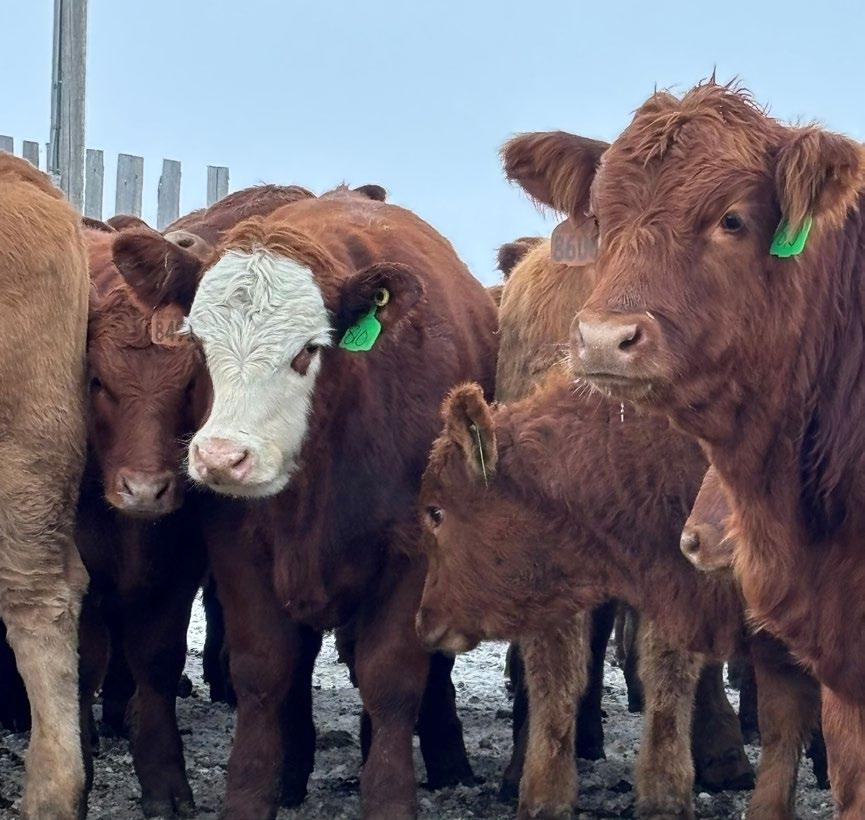
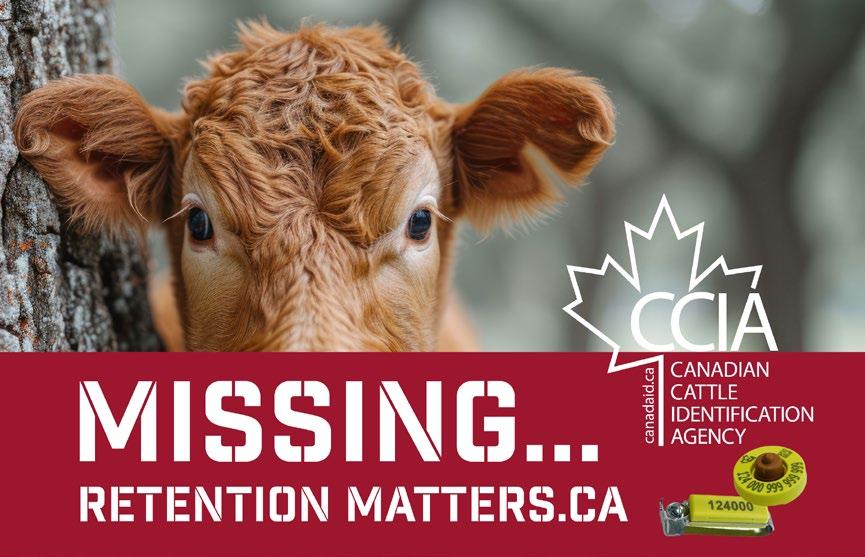
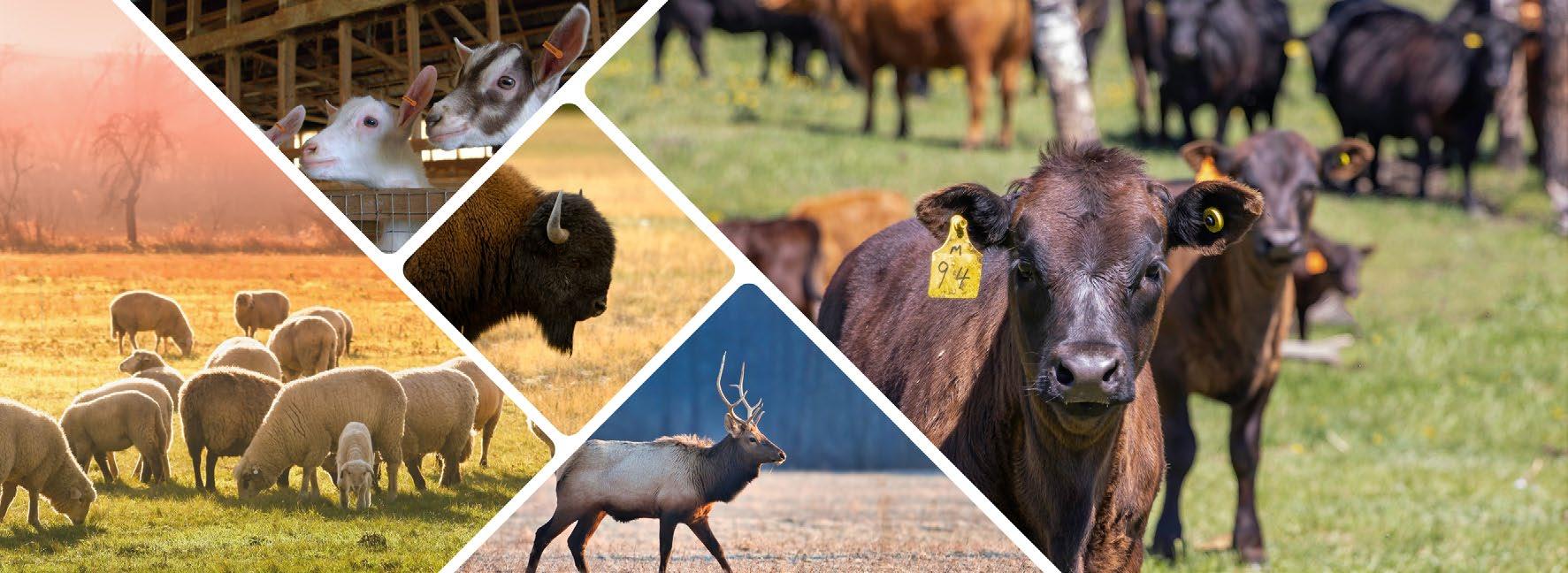


In 2023/24, the Canadian Beef Cattle Check-Off revenue totalled $18,309,743 on cattle marketed, net of the provincial portion of the federal levy
The total check-off funds collected from cattle marketings were allocated as:
• 57 per cent to market development and promotion 27 per cent to research
• 11 per cent retained by provincial cattle associations for regional marketing and research
• 5 per cent to public and stakeholder engagement
The import levy on beef cattle, beef and beef products imported into Canada was collected at a rate of $1 per head equivalent, for a total of $1,269,638 These funds, net administration, are allocated to unbranded, generic beef marketing such as nutrition marketing, recipe development and culinary skills education
$918,845 was spent on the administration of the Canadian Beef Check-Off Agency and the Board, which was under budget by $82,005
The Agency’s programs supported the operations and Board, as well as the Agency’s three strategic objectives:
1 Sound Governance and Administration
2 Structured Reporting and Compliance
3 Educated and Engaged Stakeholders
Sound Governance and Administration
This past year, the Agency kicked off its regular scheduled bylaw review with a deep dive and recommended edits to update and modernize that piece of the Agency’s governance framework A complete revision of the formatting and numbering system will accompany any larger scale changes recommended to ensure that the bylaws reflect the Agency’s true operation and the intention of the stakeholders who the Agency is accountable to
Another area the Agency focused on this past year was the proposal and implementation plan for the increased provincial cattle association administration fee, timed for April 1, 2024 Amending agreements were created for the provincial cattle associations and delivered in March in time for the April implementation date The modernized administration fee will compensate provincial cattle associations for collecting the national check-off based on a percentage of the amount per head that they collect and be deducted from the national check-off on all marketings
Building off the work in previous years, the Agency continued to explore the Scientific Research and Experimental Development (SR & ED) credit opportunities for Canadian beef producers who invest in research through the national check-off While there is still more work to be done, we are working closely with the Beef Cattle Research Council (BCRC) and our consultant partners at KMPG LLP to finalize the feasibility of the program for the Canadian beef industry administered through the Agency
Structured Reporting and Compliance
In the 2023/24 fiscal year, the Agency completed its first ever national service provider

audit The inspectors conducted an audit of Canada Beef and followed the check-off funds from receipt to investment The audit confirmed that Canada Beef continues to do business in a manner that check-off paying producers can rely on, knowing that dollars are being invested in a transparent manner
Twenty-eight field inspections in two different provinces were undertaken this year, ensuring that the Agency continues to be focused on compliance when it comes to collection and remittance across the country Over $165,000 in slipped check-off was identified in BC, and over $42,000 in slipped veal check-off was identified in Ontario
Two provincial cattle associations also signed new inspection services agreements, and the Agency’s Manager of Compliance and Education also spoke at four Atlantic province events to educate and engage producers around check-off collection and remittance
Agency staff have worked directly with the provincial cattle associations to help solve specific remittance and collection issues at the grassroots level This continues to show the value of the Agency to helping problem solve regulatory framework hurdles and understand the impacts of specific situations on future decisions Having a well-rounded Agency team helps to understand impacts from all angles and recommend strategies to move forward with a unified plan in place
The Agency focused on strengthening relationships across the industry, and representatives from our organization attended many industry events and meetings Presentations were provided at many provincial and national organization’s meetings, and the Agency continues to engage beef producers and the Government of Newfoundland to find ways to work together on check-off collection and remittance in that province
The Agency’s first Youth Member, Julie Mortensen, has completed her two-year term, and the value of recruiting a Youth Member to the Agency as an observer has paid off for the organization The Agency worked in tandem with the Canadian Cattle Youth Council to create a new recruitment plan to fill the Youth Member observer seat at the end of Julie’s term at the 2024 AGM We are now happy to welcome Adeleen Bolduc from Stavely, AB as the new Youth Member Addy has extensive beef industry experience and will be an excellent voice for young Canadian beef producers
Also, in the realm of youth engagement, the Agency awarded our second scholarship in August 2024 to Gus Halibert of Saskatchewan Gus’ entry received top scores from the judging committee in a pool of more than 20 video entrants from across the country The number of applicants stayed steady from the year previous, so we are confident that the scholarship is reaching young beef industry members across Canada
As the new Agency Chair, I am looking forward to meeting the goals and objectives of our strategic plan on behalf of the Canadian beef industry We continue to work towards a unified and sustainable national funding strategy for Canadian beef cattle research, market development and promotion
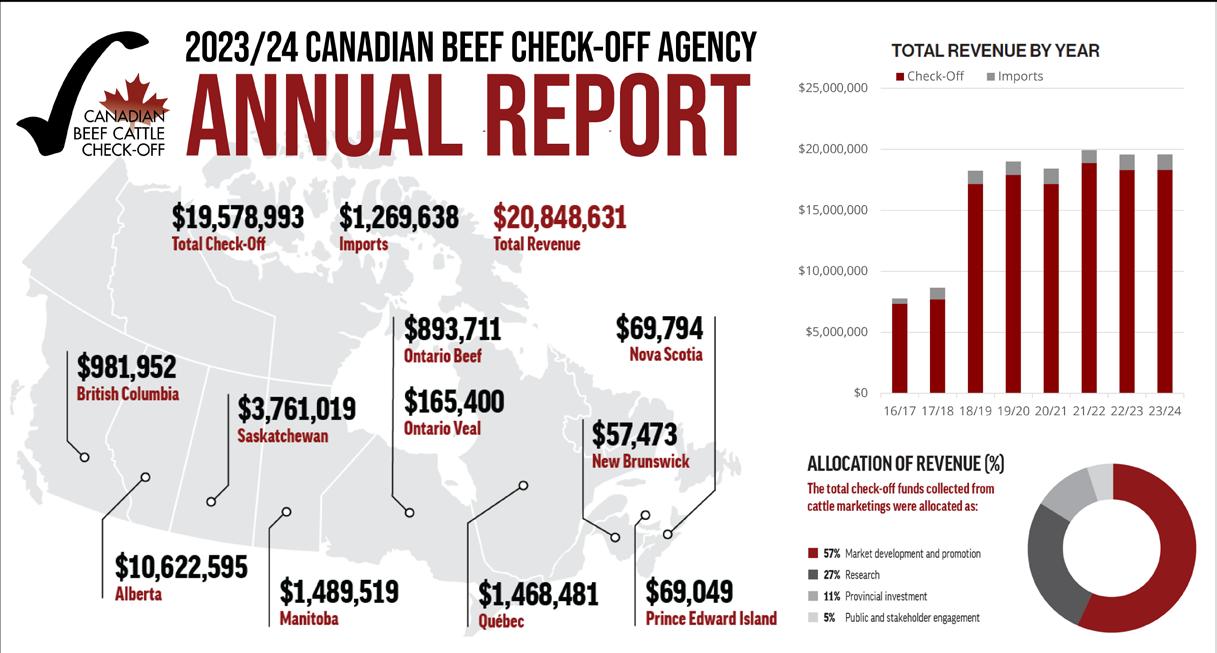




Over the past year, Canadian cattle feeders have encountered multiple challenges including difficult weather, supply chain barriers, trade irritants, industry strikes and labour shortages These challenges unfolded in the context of several provincial elections, federal political uncertainty and international unrest
NCFA continues to work with government and stakeholders to provide practical and timely solutions NCFA’s dedicated directors, members, and staff have worked tirelessly this year to manage challenges and pursue opportunities for the fed cattle industry NCFA is optimistic for the sector as we head into 2025
In collaboration with our industry partners, NCFA has reduced barriers and created opportunities for growth and increased competitiveness among Canadian fed cattle producers Successes in 2024 include:
Successfully advocated for an automatic exemption from the ‘Underused Housing Tax’ for farmers who own homes for the purpose of housing farm workers
• Secured progress on Electronic Logging Devices (ELDs): NCFA advocated for clear guidelines recognizing animal welfare as an emergency The Canadian Council of Motor Transport Administrators (CCMTA) revised its guidelines to reflect this
• Consistently advocated for new innovations such as methane-reducing feed ingredients to be approved in Canada in a timely manner In January 2024, CFIA approved 3-Nitrooxypropanol (3NOP) as a new livestock feed ingredient aimed at reducing methane emissions from cattle
• Ensured the federal school food policy did not include language that would discourage the serving of beef as part of the program
• Successfully advocated for the revision of the global statement on AMU/AMR, ensuring the removal of references to targets The industry remains actively engaged with the government to address ongoing messaging and related concerns
• Successfully lobbied the government to call workers back from a strike involving both Class 1 Canadian railways
Flagged the need for an increase to the AgriStability cap at the FPT Agriculture Ministerial meeting, setting the stage for further discussion in 2025
• Actively participating in the discussion on a Canadian strategy for the 2026 CUSMA review and potential tariffs
Successfully worked to ensure the Advanced Payment Program limit did not revert to the original $100,000 This increase was part of NCFA’s federal budget ‘ask’ and our ongoing advocacy efforts
• Actively working to change the National Occupation Classification (NOC) code for herdspersons and supported the introduction of the Recognized Employer Pilot (REP)

NCFA is persistently engaged with key federal decision-makers in an effort to positively impact policy, regulations and legislation Federal engagement in 2024 included:
• Ongoing engagement with MPs, Senators, political staff and senior government officials
• Feedlot tours for Ministers, MPs, Senators and senior government officials
Appearances and/or written submissions to:
– The House of Commons Agriculture Committee (carbon tax, C-275, wildfires)
– The Senate Agriculture Committee (C-234)
– The House of Commons Health Committee (C-293)
– The House of Commons Transport Committee (ELDs, labour shortages, supply chain)
– The House of Commons Environment Committee (methane emission innovations)
– The House of Commons Trade Committee (trade barriers, C-282)
• Pre-budget submission to the federal government as well as proposed election platform priorities to political parties
Numerous submissions to the federal government on NCFA priorities including trade, transport, labour, traceability, country of origin labelling, climate, feed, antimicrobial resistance, right to repair, biogas, capital gains and access to innovation
• The annual NCFA Lobby Day in Ottawa – over 50 meetings with Ministers, MPs, Senators or political staff followed by a Board meeting with several guests including Lawrence Hanson – Deputy Minister of Agriculture and Agri-Food Canada, Tacarra Birmingham – US Agriculture Attaché from US Embassy and Ted Schroeder – Ag Economics at Kansas State University
NCFA is actively advocating on multiple pieces of legislation including voicing serious concerns about both Bill C-282 (protecting supply management at trade table) and Bill C-293 (pandemic preparedness) as well as calling for the passing of Bill C-234 (removing carbon tax from propane and natural gas use on farm)
Actively advocating through social media to influence government and public opinion – In the past year gained 413 new X followers and had 61,100 post impressions
NCFA and its members identify the issues that are of greatest importance to fed cattle producers and ensure we are a lead voice in Ottawa on those priorities We partner with other national organizations to provide a key perspective to government on issues that cut across the beef value chain or across the entire agriculture sector Collectively, NCFA provincial members strengthen our national voice through coordinated advocacy efforts in regions across Canada NCFA is pleased that Beef Farmers of Ontario has now joined as a member NCFA attended several provincial member AGMs in 2024 and looks forward to attending more in 2025
NCFA believes that industry collaboration—multiple voices speaking with consistent, coherent, and complimentary messages—strengthens Canada’s beef industry As such, NCFA is a member of key organizations such as the Canadian Agri-Food Trade Alliance, Animal Health Canada and the Canadian Agricultural Human Resource Council In addition, NCFA participates on numerous working groups across a wide range of issues including FMD preparedness, traceability and carbon, as well as chairing the government-industry Animal Protein Table
NCFA also engages in international forums, with a focus on the U S These include the Pacific NorthWest Economic Region (PNWER), State Agriculture and Rural Leaders (SARL), the Tri-Lateral Agriculture Accord and the World Organization for Animal Health (WOAH)
The National Cattle Feeders’ Association (NCFA) serves as a unified voice for Canada’s fed cattle producers. We work to improve the growth and competitiveness of the beef sector in Canada. Our membership is comprised of provincial beef organizations from Canada’s major cattle feeding regions.


Beef Producer National Check-Off Investments in Research
The Beef Cattle Research Council (BCRC) is Canada’s industry-led funding agency for beef, cattle and forage research and extension The BCRC is directed by a committee of 16 beef producers from across the country
Funded primarily through the research allocation of the Canadian Beef Cattle Check-Off, the BCRC received on average $0 67 (unaudited) of every $2 50 from the 2023/24 provincial allocation
This funding was leveraged under the Beef Science Cluster program with Agriculture and Agri-Food Canada (AAFC) Canadian Agricultural Partnership funding, where industry contributed 42% ($1 50 million) and AAFC contributed 58% ($2 05 million) in 2023/24
In addition, the BCRC leveraged the Canadian Beef Cattle Check-Off for an additional $3 9 million in research funding and $247,000 in-kind from government and industry partners through initiatives outside of the Beef Science Cluster
Beef Science Cluster IV
Beef Cluster IV, titled ‘Canada’s Beef and Forage Cluster: Driving environmental, economic, and social sustainability’, focuses on driving the growth of Canada’s beef industry and the overall economy by sustainably advancing Canadian beef and forage production while reducing the industry’s environmental footprint Twenty-three projects were approved for a total Cluster size of $21 7 million ($9 6 million from industry and $12 1 million from AAFC) and completed their first year in March 2024


All projects are focused on three centralized themes: economic growth and development, climate change and environment, and sector resilience and societal challenge
Cluster IV project objectives include:
improved diagnostics and vaccines to manage production-limiting diseases in cattle,
• development of new forages that have the potential to thrive across Canada, improvement of food safety technologies in beef processing facilities to reduce the use of water and energy, and
• development of practical, science-based resources and economic decision-making tools to support the Canadian beef industry
Desire for a bloat-free legume that provides gains comparable to alfalfa has increased interest in the use of sainfoin A Cluster III project investigated regional differences in grass/sainfoin interactions, developed new sainfoin germplasm for grass/ sainfoin mixed stands, determined the nutritional value of new sainfoin and grass/sainfoin stands and developed integrated crop management practices to optimize growth and longevity of grass/sainfoin pastures Higher proportions of sainfoin in the mix increased the forage value and digestibility Sainfoin was compatible with cool season grasses during establishment and persisted through drought
See: https://www.beefresearch.ca/fact-sheets/new-sainfoin-varieties/
Canadian beef & forage research & innovation




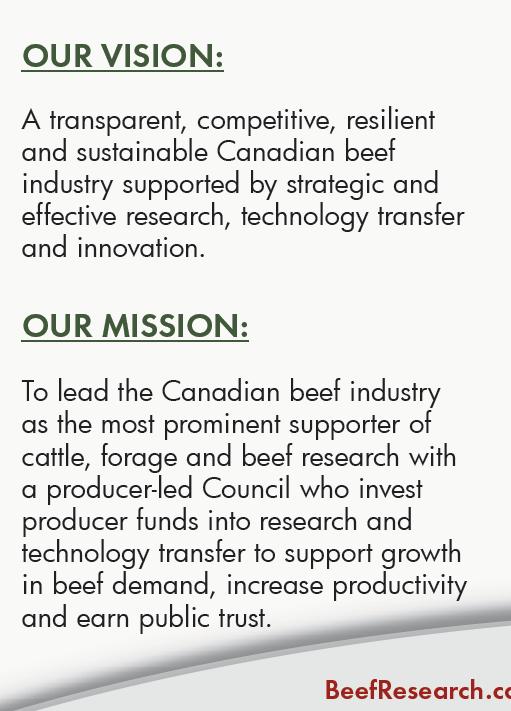




Priority Research Projects Underway
In addition to projects within the Science Cluster, the BCRC funds research projects aimed at achieving specific goals of high priority in the beef industry In addition to the 100+ current projects, nine new research projects were awarded a total of $1 4 million in funding through the 2024 annual call These projects include:
• Remote ante and postmortem meat inspections using augmented-reality livestream video software
Use of laser-induced breakdown spectroscopy to quickly evaluate feed nutrient value on-farm
• The association of fibre digestion efficiency and host genetic makeup
• Micronutrient deficiencies in fall placed calves and their adaptation to the feedlot environment
Summaries of all projects are available on BeefResearch.ca
BCRC Proof of Concept (POC) Informs Research Investment
The BCRC funds short-term projects to inform whether a novel idea has merit, validate practices or determine if technologies used in other sectors, industries or countries have potential to move the needle in Canadian beef herds One POC project led by Dr Nilusha Malmuthuge at Agriculture and Agri-Food Canada in Lethbridge examined the effects of good vaccine handling practices on vaccine efficacy The use of good vaccine practices including mixing modified live vaccines less than one hour prior to use and storing mixed vaccines in a cooler increased the efficacy of vaccine against Bovine Viral Diarrhea Virus
See: https://www.beefresearch.ca/fact-sheets/do-better-vaccine-practices-make-healthier-calves/ CowBytes
CowBytes ration-balancing software was developed by Alberta Agriculture and Forestry (AAF) and available for purchase from AAF until 2020 The BCRC assumed the CowBytes trademark and responsibility for the software in 2023 The Saskatchewan Ministry of Agriculture is an active partner, providing technical support for users and the beef nutrition expertise to lead future upgrades
The software allows producers to formulate their own feed rations while considering various combinations of feed and by-products at different prices, and in doing so, can find a way to reduce feed costs while still meeting production targets Ensuring that cattle are being fed a balanced ration can also save producers on feed costs in the long run by preventing over- or under-feeding
It is available for purchase at www.cowbytes.ca
Insight into the 2023 Canadian Cow-Calf Survey
The 2023 Cow-Calf Survey collected information from 600 producers across nine provinces from the 2022 breeding season through the 2023 weaned calf crop Fifty-seven respondents from Manitoba reported on 7,555 beef cows, representing 9 5% of the total respondents and 9 5% of the reported beef cows
In Manitoba:
• Breeding season average: 104 days for cows, 93 days for heifers
• Calving – females calved in the first cycle: 53 6% of cows, 62 3% of heifers
More than half the Manitoba respondents feed test at least once per year, over one quarter test less than once per year
– Feed test results are used for developing rations on-farm (57 8%), with a nutritionist (26 7%) and with an extension specialist (13 3%)
– Reasons for not feed testing include cattle seem healthy (41 7%), cost (16 7%), lack of knowledge on utilizing feed test results (8 3%) and unfamiliarity with collecting and sending a feed test (8 3%)
• 33 4% of Manitoba respondents have tested for water quality at least once in the last three years
– Reasons for not testing water include people drink from the same water source (28 9%), the assumption of good water from a spring or well (26 3%), cattle seem healthy (10 5%) and unfamiliarity with collection and sending for analysis (10 5%)
• 93% of respondents vaccinate their cattle
– Cows were primarily vaccinated for reproductive diseases (80 0%), Clostridial diseases (72 0%) and BRD (68 0%)
– Replacement heifers were primarily vaccinated for Clostridial diseases (92 0%), reproductive diseases (80 0%), and BRD (80 0%)
– Calves were primarily vaccinated for Clostridial diseases (88 0%) and BRD (48 0%)
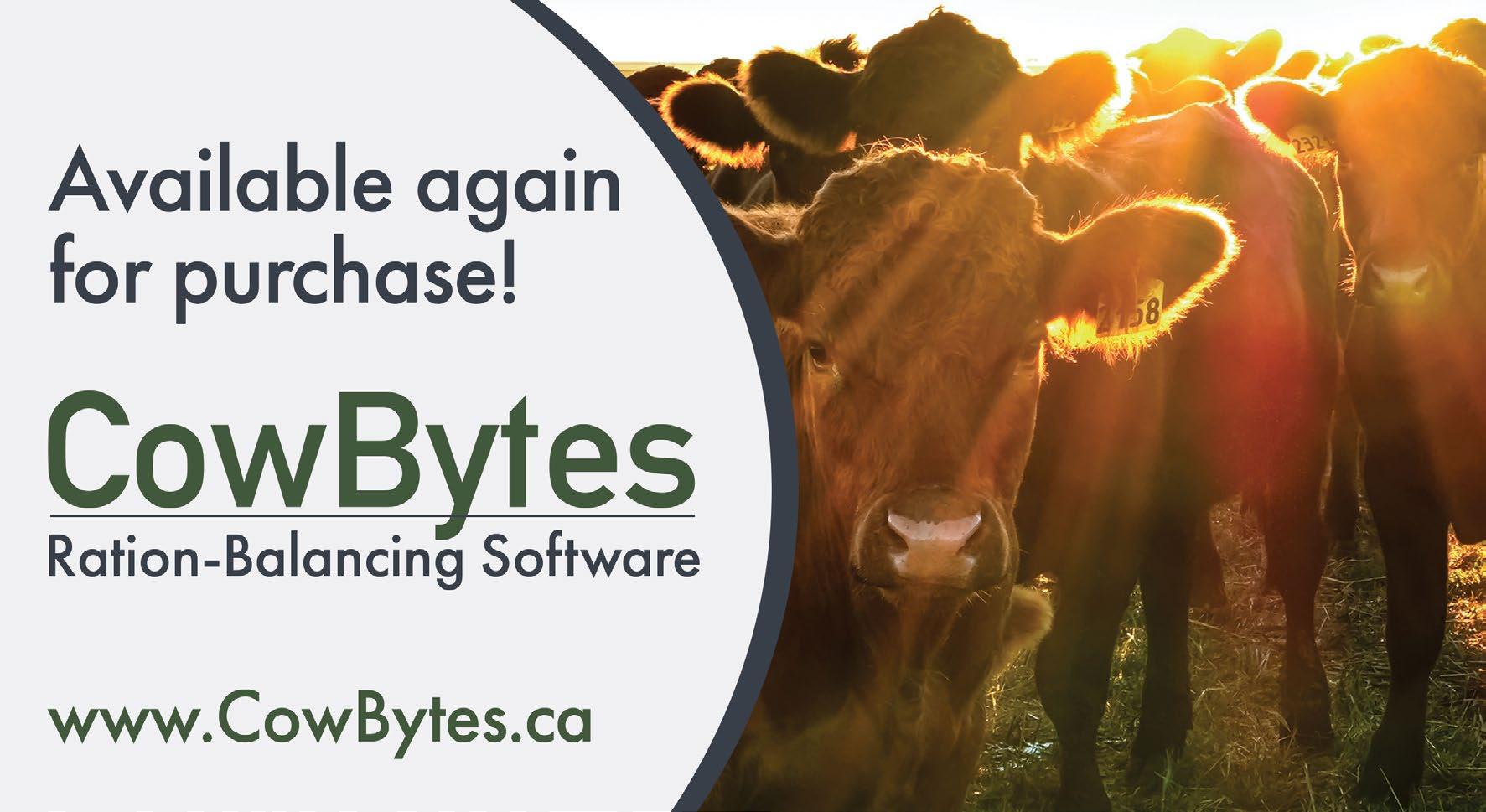

The BCRC hosts a suite of interactive tools and calculators designed to help producers make economic and science-based decisions Calculators are available online or for download as an Excel spreadsheet Current calculators include:
• Cow-Calf Production Indicators Calculator (provides regional benchmark data)
• Bull Valuation Calculator
• Value of Calving Distribution Calculator
• Impact of Body Condition on Cow Productivity and Profitability
• Economics of Water Systems Calculator
Learn more at BeefResearch ca under the Tools & Calculators tab
Dr Claudia Narvaez-Bravo at the University of Manitoba led a team to investigate various Shiga toxin-producing E coli (STEC) and their ability to form biofilms and withstand commonly used sanitizers in meat processing facilities Biofilms pose a significant food safety risk because they are invisible, protect bacterial colonies from sanitizers, help them to persist and continuously re-colonize the environment They found that sanitizer efficacy varied based on the temperature, surface type and combination of bacteria in the biofilm Biofilms formed at 10°C with lactic acid bacteria are more susceptible to sanitizers Sanitizer use should be combined with thorough scrubbing to remove biofilms and reduce bacterial levels See: https://www. beefresearch.ca/fact-sheets/shiga-toxigenic-e-coli-persistence-mechanisms-and-surface-biofilm-detection-using-near-infrared-spectroscopy-on-beef-processing-facilities/
Subscribe to the BCRC e-mail list and learn more about BCRC initiatives, resources and decision-making tools for beef producers at
latest Canadian beef research & innovation
GATEWAY TO TOOLS & RESOURCES
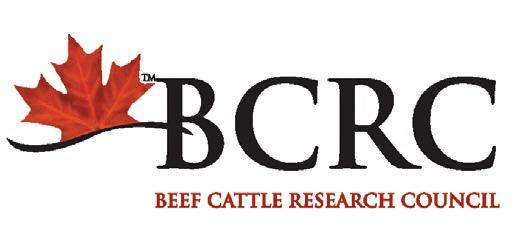
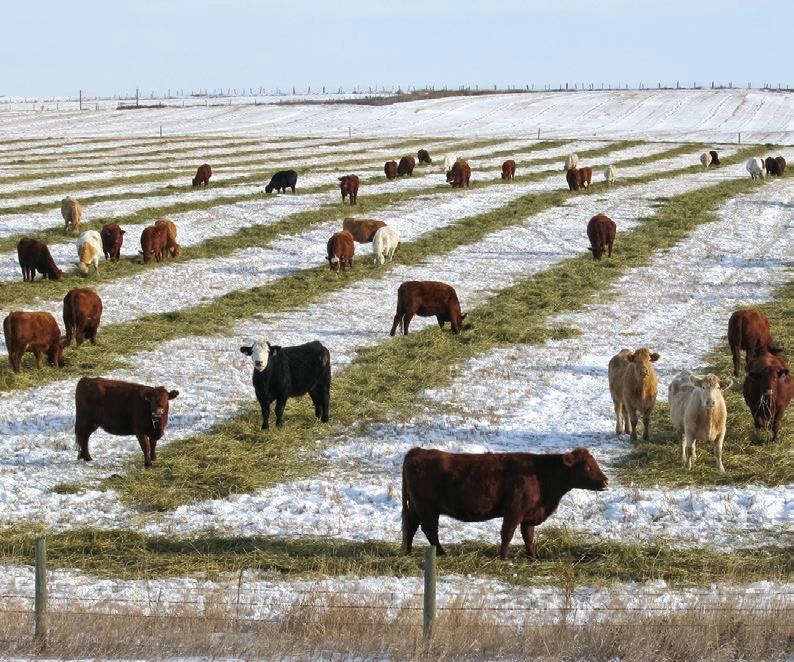
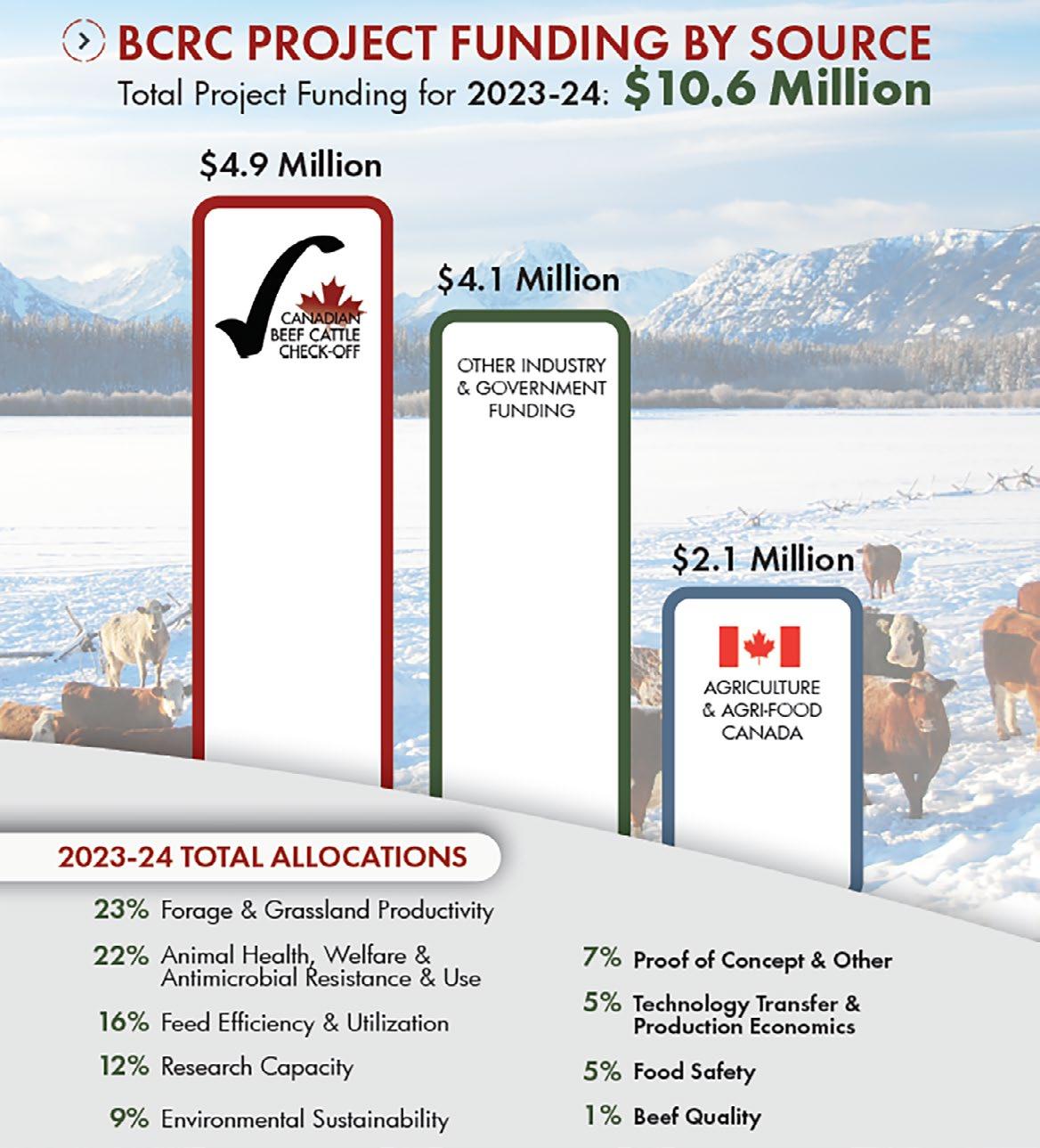


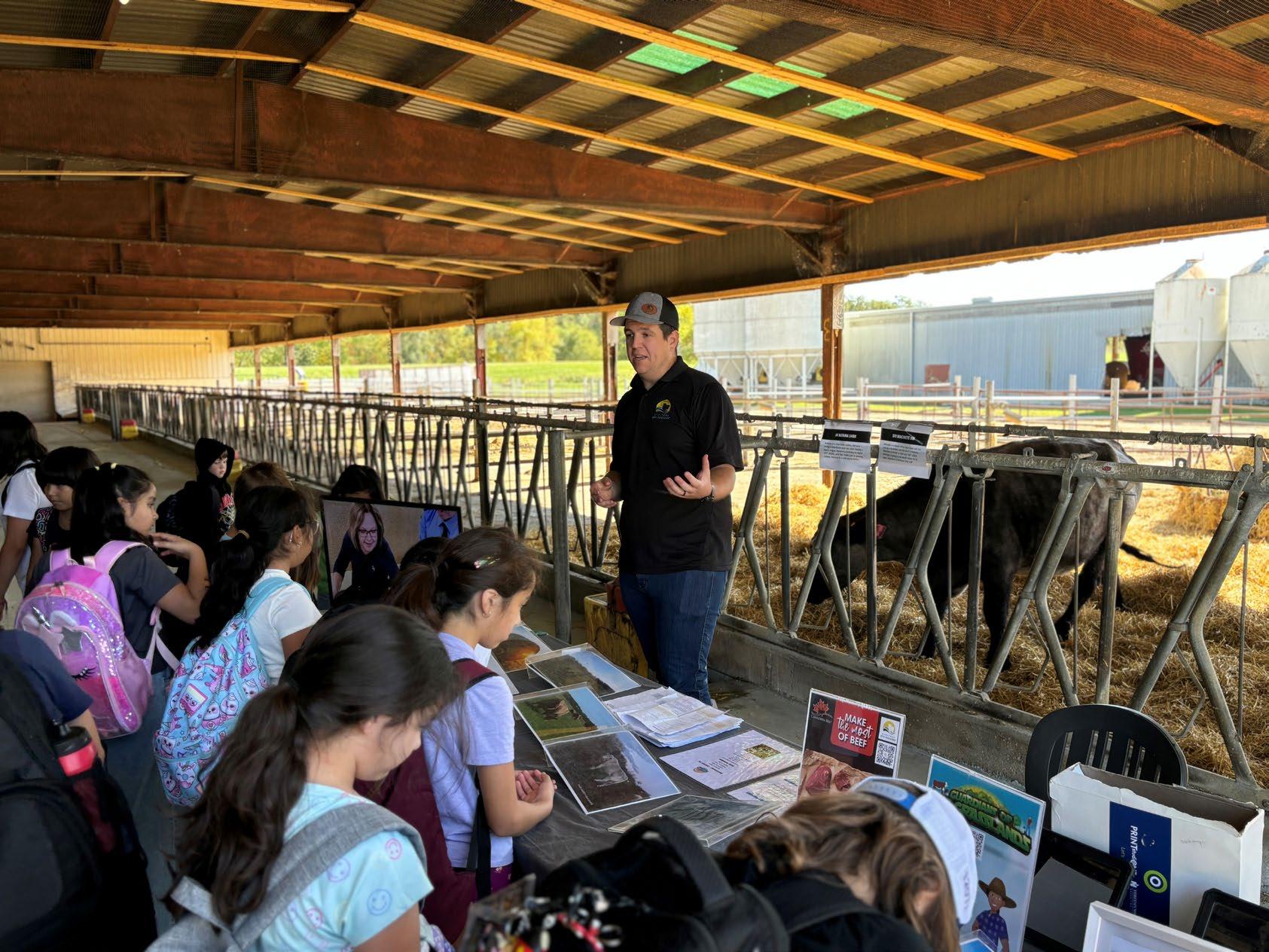






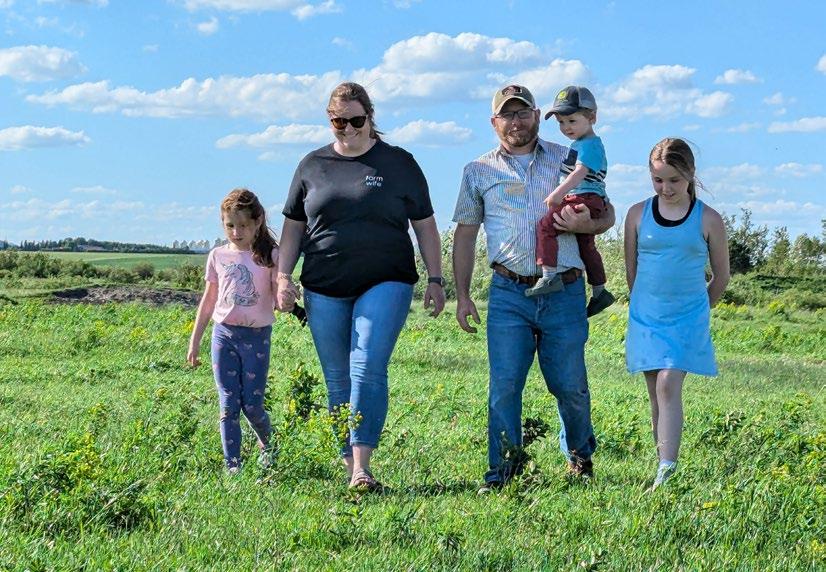

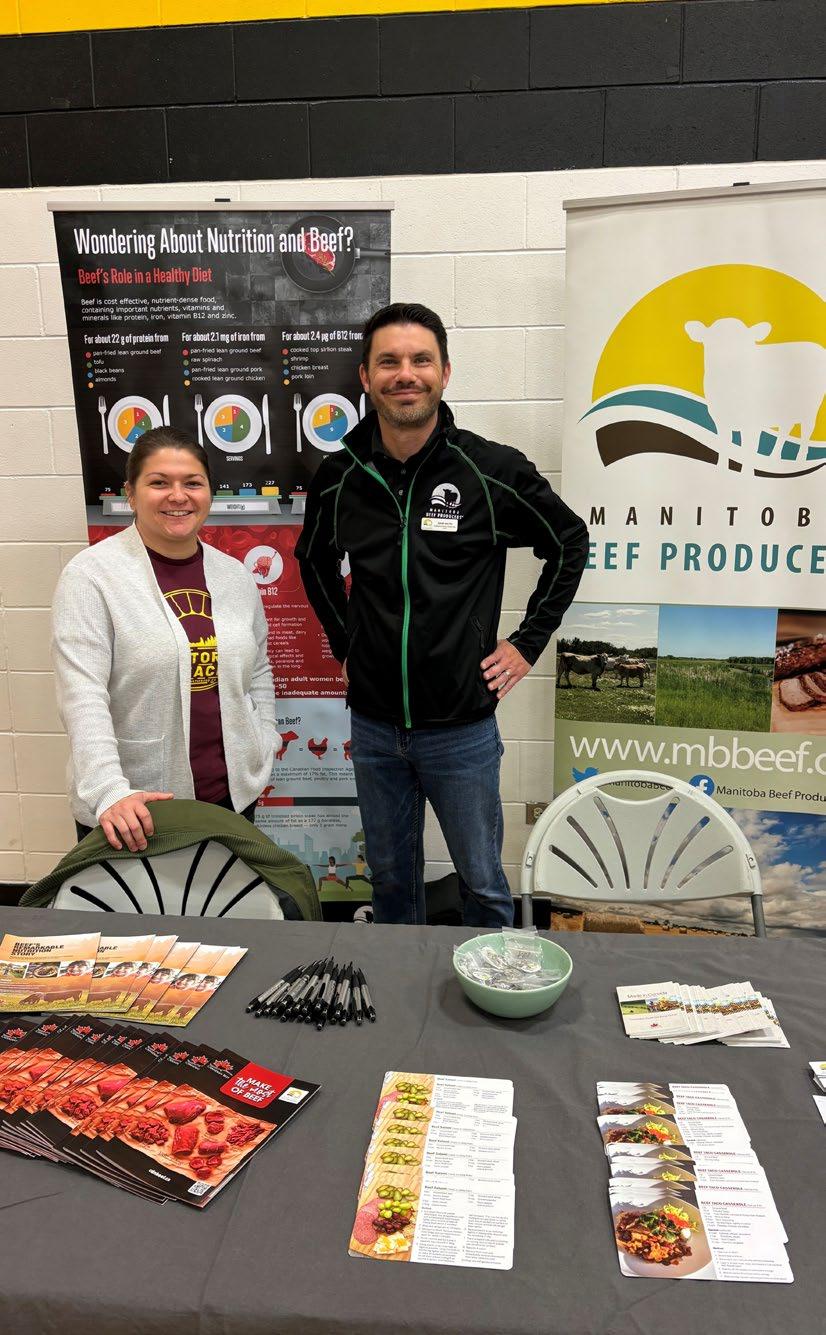



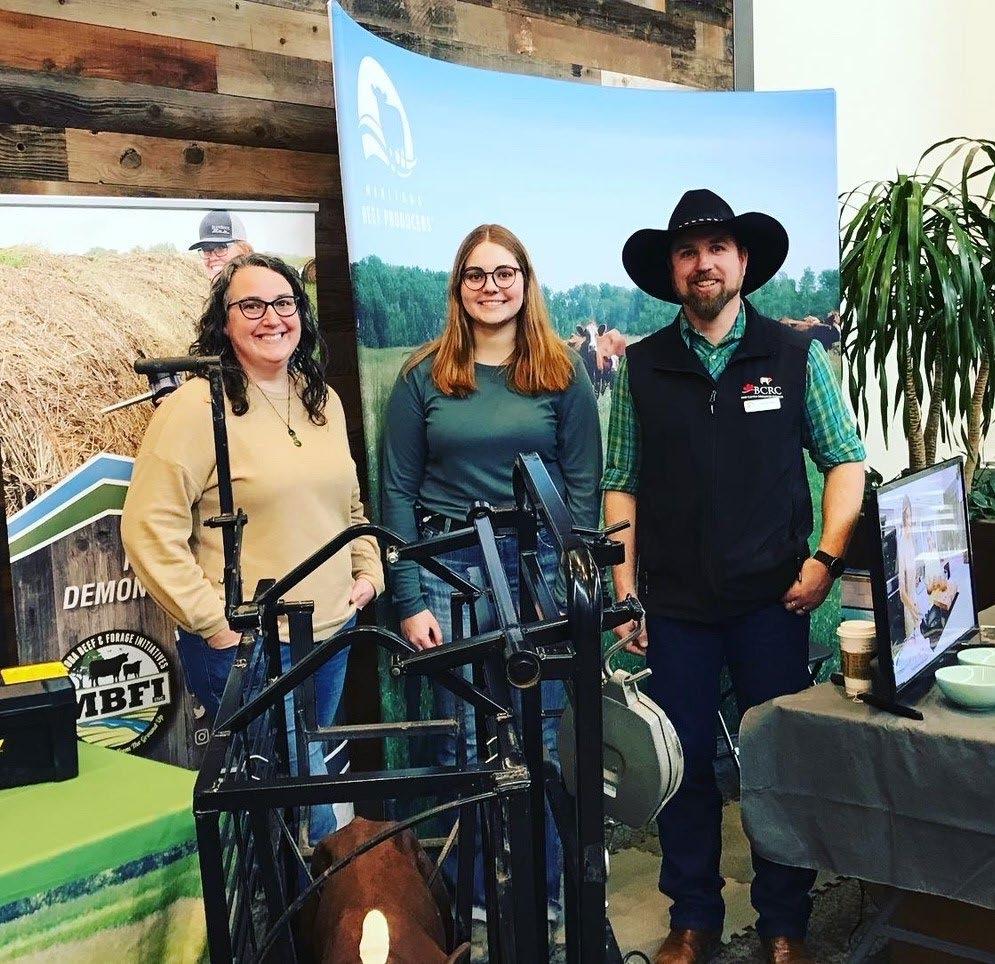






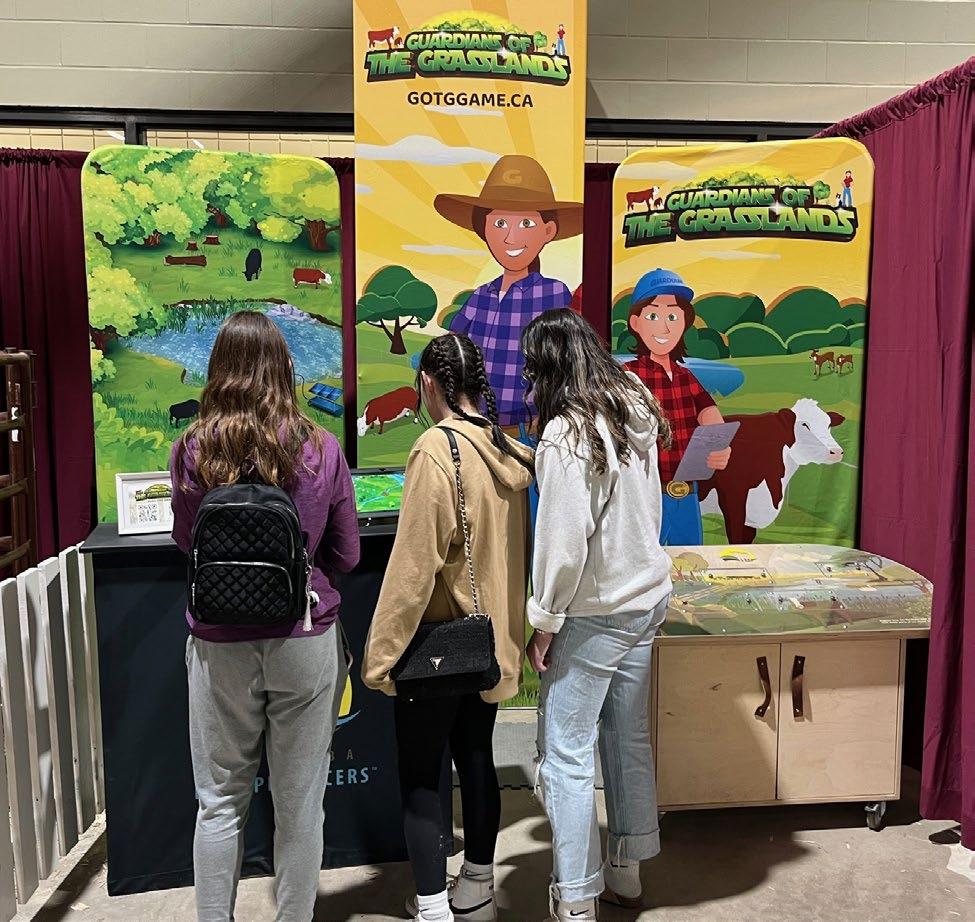




In February Manitoba Beef Producers was very pleased to present Dr Allan Preston with MBP’s Lifetime Achievement Award at its 46th Annual General Meeting This award was developed to recognize Manitoba cattle producers who have made significant contributions to the beef industry and their commitment to excellence, exemplifying leadership and involvement in their community and province It is awarded every five years Dr Preston, a veterinarian and cattle producer, had a long career with Manitoba Agriculture, and he did key work on files related to Manitoba’s beef industry, including floods, droughts, BSE, bovine tuberculosis and many, many more After leaving government, he also served the beef sector for several years in his role as Bovine TB Coordinator Unfortunately, bad weather prevented Dr Preston being in person at MBP’s AGM to accept the award . On a related noted, MBP was also very pleased to write a letter of recommendation as part of Dr Preston being nominated for induction into Manitoba Agricultural Hall of Fame, and Dr . Preston was inducted into the hall at a ceremony in July Here he is pictured at that event with MBP Policy Analyst Maureen Cousins (right) and Wanda McFadyen, Executive Director of the Assiniboine River Basin Initiative, another organization that wrote a letter of recommendation for his induction into the Hall of Fame
